kamancodeconduct
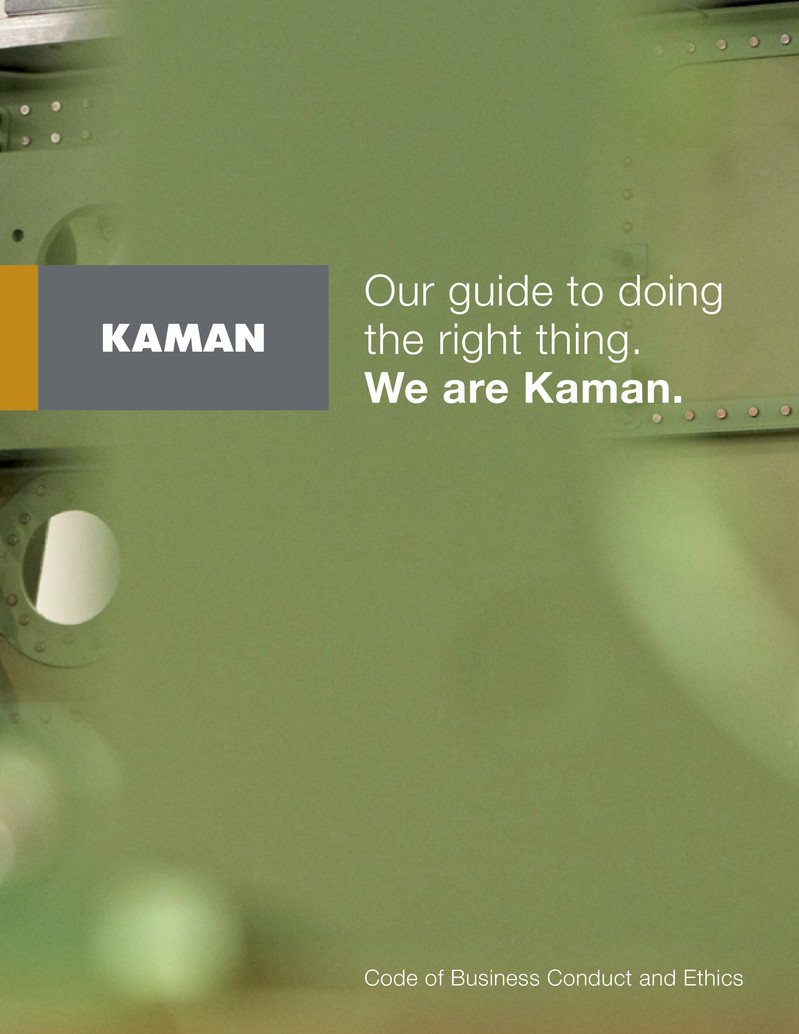
Our guide to doing the right thing. We are Kaman. Code of Business Conduct and Ethics
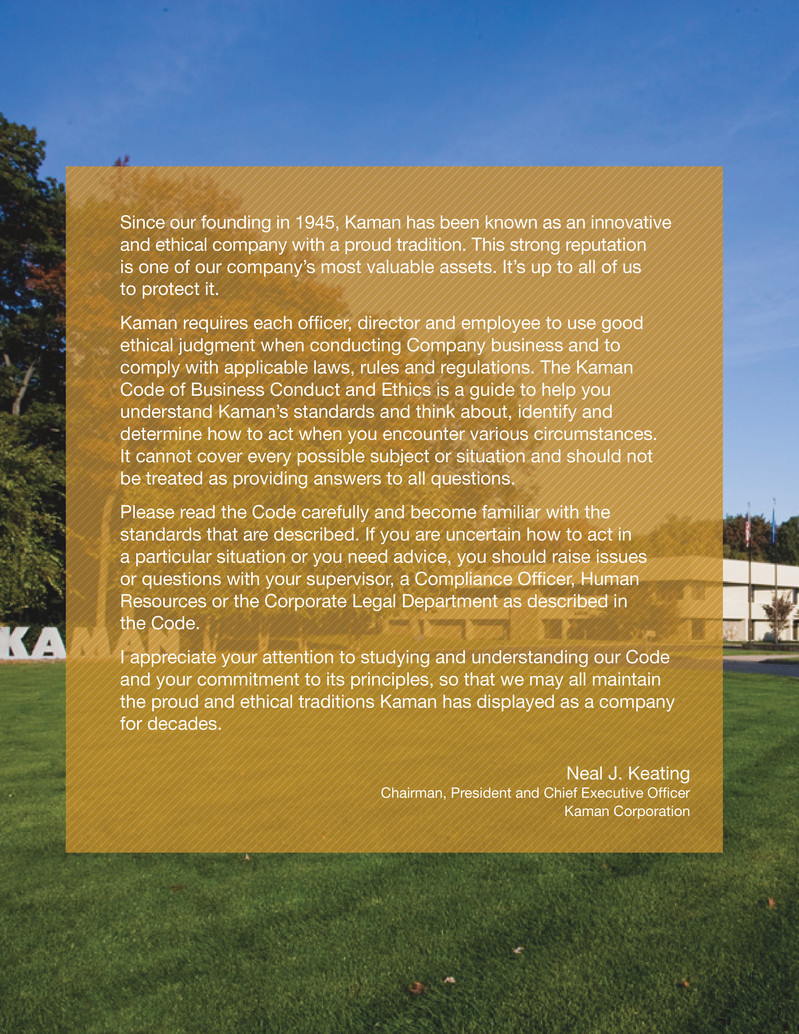
Since our founding in 1945, Kaman has been known as an innovative and ethical company with a proud tradition. This strong reputation is one of our company’s most valuable assets. It’s up to all of us to protect it. Kaman requires each officer, director and employee to use good ethical judgment when conducting Company business and to comply with applicable laws, rules and regulations. The Kaman Code of Business Conduct and Ethics is a guide to help you understand Kaman’s standards and think about, identify and determine how to act when you encounter various circumstances. It cannot cover every possible subject or situation and should not be treated as providing answers to all questions. Please read the Code carefully and become familiar with the standards that are described. If you are uncertain how to act in a particular situation or you need advice, you should raise issues or questions with your supervisor, a Compliance Officer, Human Resources or the Corporate Legal Department as described in the Code. I appreciate your attention to studying and understanding our Code and your commitment to its principles, so that we may all maintain the proud and ethical traditions Kaman has displayed as a company for decades. Neal J. Keating Chairman, President and Chief Executive Officer Kaman Corporation
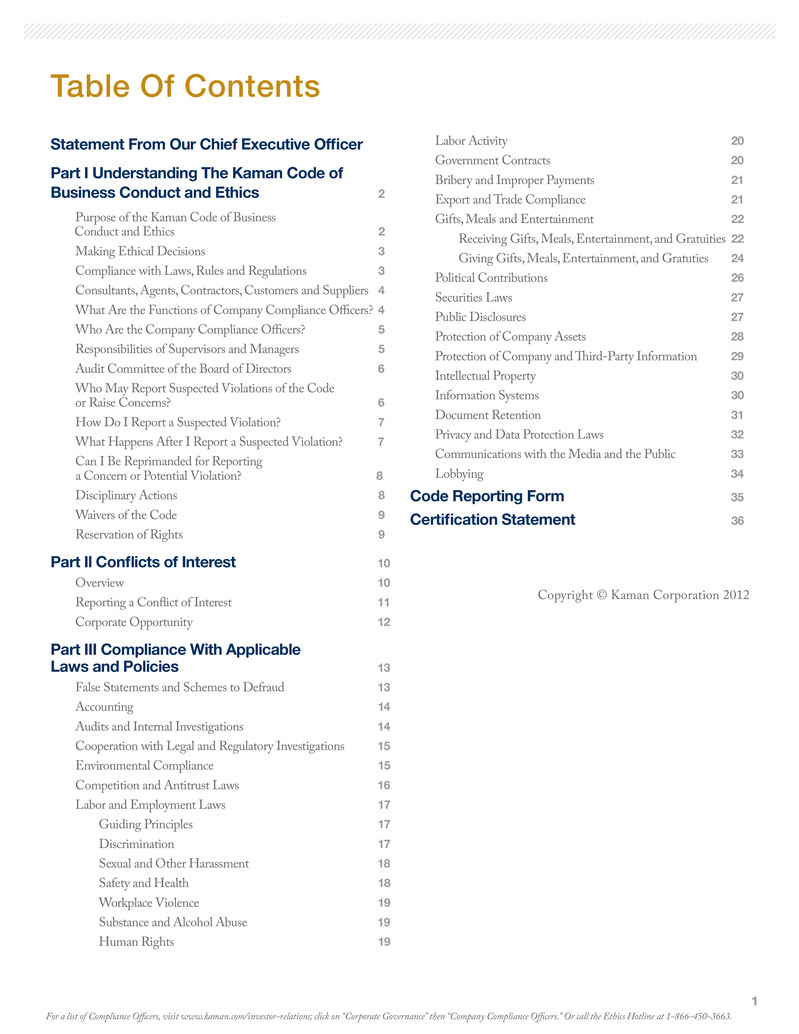
1 For a list of Compliance Officers, visit www.kaman.com/investor-relations; click on “Corporate Governance” then “Company Compliance Officers.” Or call the Ethics Hotline at 1-866-450-3663. Table Of Contents Copyright © Kaman Corporation 2012 Statement From Our Chief Executive Officer Part I Understanding The Kaman Code of Business Conduct and Ethics 2 Purpose of the Kaman Code of Business Conduct and Ethics 2 Making Ethical Decisions 3 Compliance with Laws, Rules and Regulations 3 Consultants, Agents, Contractors, Customers and Suppliers 4 What Are the Functions of Company Compliance Officers? 4 Who Are the Company Compliance Officers? 5 Responsibilities of Supervisors and Managers 5 Audit Committee of the Board of Directors 6 Who May Report Suspected Violations of the Code or Raise Concerns? 6 How Do I Report a Suspected Violation? 7 What Happens After I Report a Suspected Violation? 7 Can I Be Reprimanded for Reporting a Concern or Potential Violation? 8 Disciplinary Actions 8 Waivers of the Code 9 Reservation of Rights 9 Part Il Conflicts of Interest 10 Overview 10 Reporting a Conflict of Interest 11 Corporate Opportunity 12 Part III Compliance With Applicable Laws and Policies 13 False Statements and Schemes to Defraud 13 Accounting 14 Audits and Internal Investigations 14 Cooperation with Legal and Regulatory Investigations 15 Environmental Compliance 15 Competition and Antitrust Laws 16 Labor and Employment Laws 17 Guiding Principles 17 Discrimination 17 Sexual and Other Harassment 18 Safety and Health 18 Workplace Violence 19 Substance and Alcohol Abuse 19 Human Rights 19 Labor Activity 20 Government Contracts 20 Bribery and Improper Payments 21 Export and Trade Compliance 21 Gifts, Meals and Entertainment 22 Receiving Gifts, Meals, Entertainment, and Gratuities 22 Giving Gifts, Meals, Entertainment, and Gratuties 24 Political Contributions 26 Securities Laws 27 Public Disclosures 27 Protection of Company Assets 28 Protection of Company and Third-Party Information 29 Intellectual Property 30 Information Systems 30 Document Retention 31 Privacy and Data Protection Laws 32 Communications with the Media and the Public 33 Lobbying 34 Code Reporting Form 35 Certification Statement 36

2 The Kaman Code of Business Conduct and Ethics (the “Code”) is a statement of the principles and standards that Kaman Corporation and its subsidiaries expect all employees, officers, directors, contractors, agents and consultants (the “Kaman community”) to follow in conducting business activities whenever and wherever that may be. The Code describes what is considered appropriate behavior and helps guide us in making ethical business decisions that maintain our commitment to integrity. The Code is not a comprehensive rulebook, but instead should be used as a resource to determine the ethical appropriateness of a situation and where to seek guidance when in doubt. Our policy is to prevent unlawful or unethical behavior and to halt any such behavior as soon as reasonably possible after its discovery. Failure to comply with the Code and applicable laws can have severe consequences for both the individuals involved and the Company, including disciplinary action, civil penalties or criminal prosecution under certain circumstances. Purpose of the Code ABOUT THIS CHAPTER: This Code provides guidance to the Kaman community about the Company’s policies and procedures, so Kaman can continue to build upon its long-standing tradition of integrity. PART I: UNDERSTANDING THE KAMAN CODE OF BUSINESS CONDUCT AND ETHICS We value excellence across all operations, through our commitment to ethical behavior, customer service, innovation, and prudent financial management. Q&A ABOUT THE CODE Why was the Code created? It provides a standard for how members of the Kaman community are expected to conduct themselves. Who must follow the Code? All employees, officers, directors of the Company, as well as consultants, contractors and agents are responsible for following the Code.
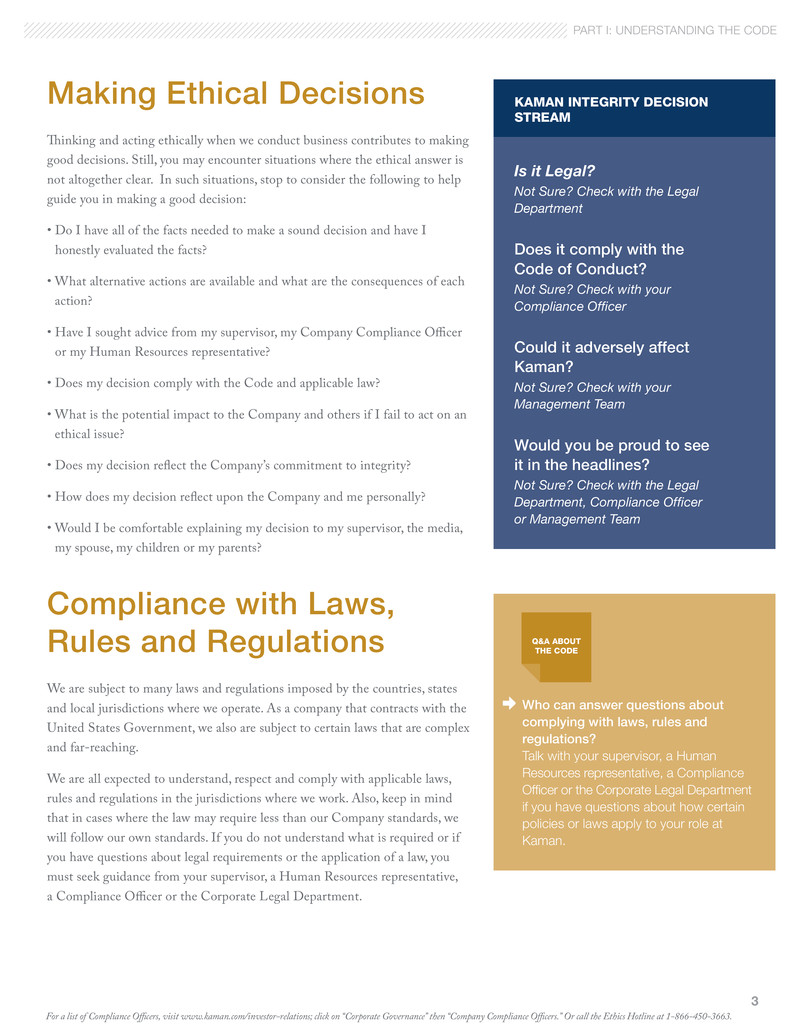
3 For a list of Compliance Officers, visit www.kaman.com/investor-relations; click on “Corporate Governance” then “Company Compliance Officers.” Or call the Ethics Hotline at 1-866-450-3663. Making Ethical Decisions Thinking and acting ethically when we conduct business contributes to making good decisions. Still, you may encounter situations where the ethical answer is not altogether clear. In such situations, stop to consider the following to help guide you in making a good decision: • Do I have all of the facts needed to make a sound decision and have I honestly evaluated the facts? • What alternative actions are available and what are the consequences of each action? • Have I sought advice from my supervisor, my Company Compliance Officer or my Human Resources representative? • Does my decision comply with the Code and applicable law? • What is the potential impact to the Company and others if I fail to act on an ethical issue? • Does my decision reflect the Company’s commitment to integrity? • How does my decision reflect upon the Company and me personally? • Would I be comfortable explaining my decision to my supervisor, the media, my spouse, my children or my parents? Compliance with Laws, Rules and Regulations We are subject to many laws and regulations imposed by the countries, states and local jurisdictions where we operate. As a company that contracts with the United States Government, we also are subject to certain laws that are complex and far-reaching. We are all expected to understand, respect and comply with applicable laws, rules and regulations in the jurisdictions where we work. Also, keep in mind that in cases where the law may require less than our Company standards, we will follow our own standards. If you do not understand what is required or if you have questions about legal requirements or the application of a law, you must seek guidance from your supervisor, a Human Resources representative, a Compliance Officer or the Corporate Legal Department. Q&A ABOUT THE CODE PART I: UNDERSTANDING THE CODE Who can answer questions about complying with laws, rules and regulations? Talk with your supervisor, a Human Resources representative, a Compliance Officer or the Corporate Legal Department if you have questions about how certain policies or laws apply to your role at Kaman. KAMAN INTEGRITY DECISION STREAM Is it Legal? Not Sure? Check with the Legal Department Does it comply with the Code of Conduct? Not Sure? Check with your Compliance Officer Could it adversely affect Kaman? Not Sure? Check with your Management Team Would you be proud to see it in the headlines? Not Sure? Check with the Legal Department, Compliance Officer or Management Team

4 Consultants, Agents, Contractors, Customers and Suppliers Non-employee consultants, agents, contractors, customers and suppliers are also expected to conduct themselves in accordance with the Code. The applicable Compliance Officer is responsible for ensuring that such persons are aware of the Code and agree to conduct themselves accordingly. What Are the Functions of Company Compliance Officers? Certain employees, including senior managers, have been designated as Compliance Officers. These individuals are responsible for ensuring that the following occur: • Distribution of the Code to the Kaman community; • Educating and training personnel about the Code; • Obtaining written acknowledgements from employees, officers, directors, consultants, agents, contractors, suppliers and customers that they have read, understand and will comply with the Code as a condition of their association with Kaman; • Investigation of reported Code violations and implementation of remedial actions when a violation has been confirmed; and • Reporting Code submissions to the Company’s Chief Compliance Officer. The existence of Company Compliance Officers does not reduce every supervisor’s and manager’s responsibility to take reasonable steps to assure that employees are aware of and comply with the Code. PART I: UNDERSTANDING THE CODE

5 For a list of Compliance Officers, visit www.kaman.com/investor-relations; click on “Corporate Governance” then “Company Compliance Officers.” Or call the Ethics Hotline at 1-866-450-3663. PART I: UNDERSTANDING THE CODE Who Are the Company Compliance Officers? Your Human Resources representative can provide you with a list of the Company Compliance Officers. You also may obtain a copy of the list of Company Compliance Officers on the Company’s website at www.kaman.com/ investor-relations by clicking on the “Corporate Governance” link and then the “Company Compliance Officers” link or by calling the Ethics Hotline toll-free at 1-866-450-3663. Responsibilities of Supervisors and Managers If you are a supervisor or manager, you have the obligation to set a personal example of ethical behavior and integrity and to expect no less from the employees you supervise or manage. You are responsible for ensuring that the employees under your supervision or management receive copies of the Code and complete annual ethics training. You also are responsible for answering questions and providing prompt and responsive guidance about ethical issues to the individuals under your charge. Seek appropriate guidance from your Compliance Officer, your Human Resources representative or the Corporate Legal Department when you need assistance. Monitoring compliance with the Code is an important duty of all supervisors and managers. It is important that supervisors and managers maintain an environment of open communication where employees are encouraged to raise issues and concerns without fear of retribution. The Company does not tolerate retaliation against an employee who makes a good faith report of a concern or potential Code violation and relies upon supervisors and managers to comply with this policy. Q&A ABOUT THE CODE What are a supervisor’s or manager’s responsibilities for implementing the Code? Set a personal example of compliance Maintain open lines of communications with employees Promptly respond to employee concerns or questions about the Code or applicable law Seek guidance from a Compliance Officer, your Human Resources representative or the Corporate Legal Department when the right decision may be unclear
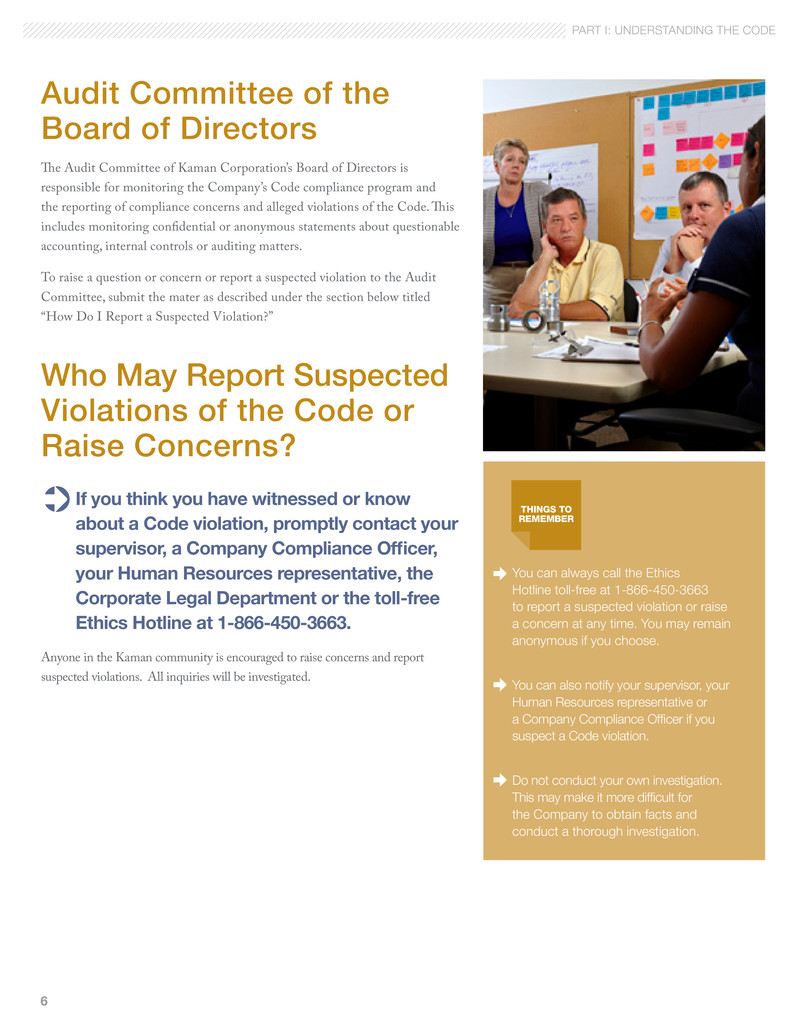
6 If you think you have witnessed or know about a Code violation, promptly contact your supervisor, a Company Compliance Officer, your Human Resources representative, the Corporate Legal Department or the toll-free Ethics Hotline at 1-866-450-3663. Audit Committee of the Board of Directors The Audit Committee of Kaman Corporation’s Board of Directors is responsible for monitoring the Company’s Code compliance program and the reporting of compliance concerns and alleged violations of the Code. This includes monitoring confidential or anonymous statements about questionable accounting, internal controls or auditing matters. To raise a question or concern or report a suspected violation to the Audit Committee, submit the mater as described under the section below titled “How Do I Report a Suspected Violation?” Who May Report Suspected Violations of the Code or Raise Concerns? Anyone in the Kaman community is encouraged to raise concerns and report suspected violations. All inquiries will be investigated. PART I: UNDERSTANDING THE CODE THINGS TO REMEMBER You can always call the Ethics Hotline toll-free at 1-866-450-3663 to report a suspected violation or raise a concern at any time. You may remain anonymous if you choose. You can also notify your supervisor, your Human Resources representative or a Company Compliance Officer if you suspect a Code violation. Do not conduct your own investigation. This may make it more difficult for the Company to obtain facts and conduct a thorough investigation.

7 For a list of Compliance Officers, visit www.kaman.com/investor-relations; click on “Corporate Governance” then “Company Compliance Officers.” Or call the Ethics Hotline at 1-866-450-3663. How Do I Report a Suspected Violation? If you see something that violates the Code or a law or regulation, promptly report it to your supervisor. If you would prefer to report the matter to someone other than your supervisor, contact a Company Compliance Officer, your Human Resources representative, the Corporate Legal Department, or the Eth- ics Hotline toll-free at 1-866-450-3663. You may also report a possible violation by using the Code Reporting Form at the end of this brochure. Reporting suspected violations promptly gives the Company the chance to investigate, and if necessary, correct the situation without having to involve governmental or other outside organizations when it may not be necessary to do so. You should not initiate your own preliminary investigation because it could make it difficult for the Company to clearly determine the facts. What Happens After I Report a Suspected Violation? If you call the Ethics Hotline to report a suspected violation, a trained representative will speak with you about the matter and will write down the points made during the telephone call. If you prefer to speak to the representative in a language other that English, an interpreter will be made available. After the telephone call is finished, a written report will be sent by the Hotline representative to the Company Compliance Officer for investigation. If you report a suspected violation to your supervisor, he or she may involve a Company Compliance Officer, the Corporate Legal Department, the Internal Audit Department, or a combination of all three as part of the investigation. All reported violations will be kept confidential to the extent possible under the circumstances. Anyone who has reported a potential violation can follow-up on the progress of an investigation by contacting their Company Compliance Officer. Company PART I: UNDERSTANDING THE CODE THINGS TO REMEMBER Report potential Code and legal violations promptly, completely and honestly. Don’t let concerns go unaddressed or unreported. You can call the Ethics Hotline at any time of the day or night to report a concern or potential violation. Contact the Ethics Hotline toll-free at 1-866-450-3663. Q&A May I Make a Report Anonymously? Absolutely. However, it may make investigating your concerns more difficult if we are unable to contact you for additional information that may be needed during the investigation. Providing your name and contact information also allows us to keep you informed about the status of the investigation.

8 Compliance Officers will try to keep all those who submit Code Reporting Forms informed about the status of the investigation to the extent reasonable and appropriate. Can I Be Reprimanded for Reporting a Concern or Potential Violation? It is important to report all potential Code violations promptly, completely and honestly. Do not let concerns go unaddressed and unreported. Anyone who honestly and in good faith reports an issue, concern or instance of apparent misconduct will not be reprimanded or penalized for doing so, even if it turns out that there was no violation of the Code or the law. The Company does not tolerate retaliation against persons who make reports honestly and in good faith. However, anyone who provides false, misleading, frivolous or malicious information may be subject to disciplinary action up to and including termination of employment. Disciplinary Actions All Kaman employees, officers and directors are required to act, to the best of their ability, in accordance with the standards described in this Code. The follow- ing actions may result in disciplinary action up to and including termination of employment: • Violating the Code • Knowingly authorizing or participating in actions that violate the Code • Failing to report a Code violation or withholding relevant and material information about a violation • Intentionally reporting false or misleading information • Retaliating, directly or indirectly, or encouraging others to do so, against anyone who reports a potential Code violation PART I: UNDERSTANDING THE CODE
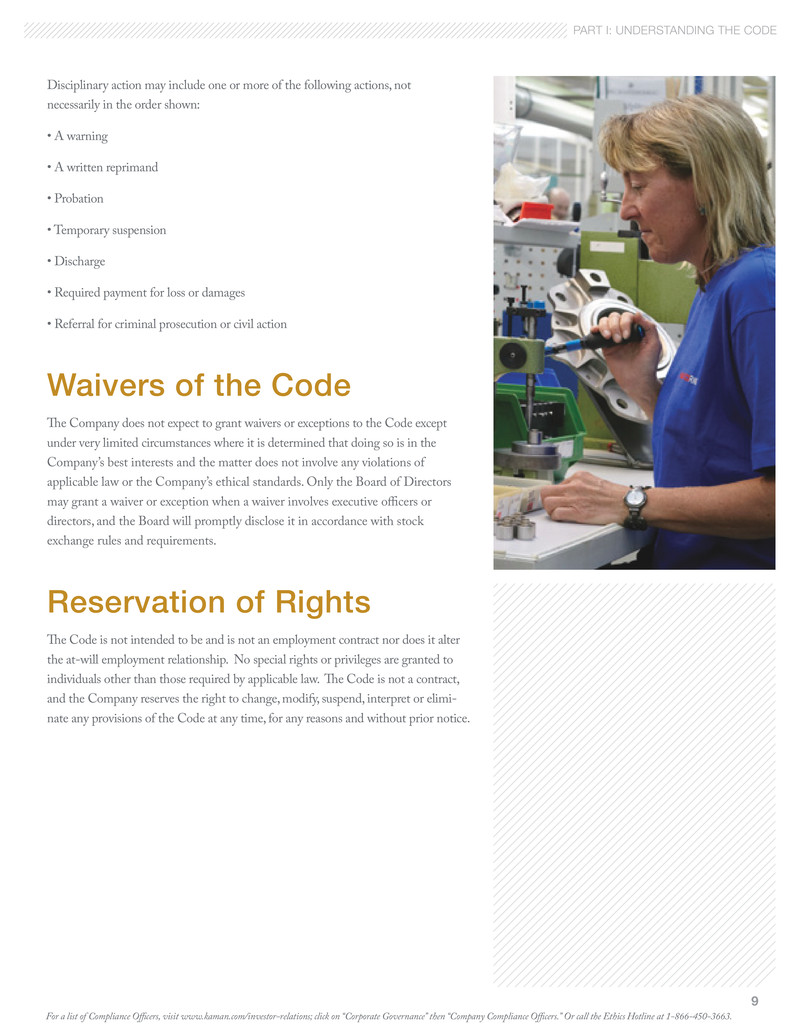
9 For a list of Compliance Officers, visit www.kaman.com/investor-relations; click on “Corporate Governance” then “Company Compliance Officers.” Or call the Ethics Hotline at 1-866-450-3663. PART I: UNDERSTANDING THE CODE Disciplinary action may include one or more of the following actions, not necessarily in the order shown: • A warning • A written reprimand • Probation • Temporary suspension • Discharge • Required payment for loss or damages • Referral for criminal prosecution or civil action Waivers of the Code The Company does not expect to grant waivers or exceptions to the Code except under very limited circumstances where it is determined that doing so is in the Company’s best interests and the matter does not involve any violations of applicable law or the Company’s ethical standards. Only the Board of Directors may grant a waiver or exception when a waiver involves executive officers or directors, and the Board will promptly disclose it in accordance with stock exchange rules and requirements. Reservation of Rights The Code is not intended to be and is not an employment contract nor does it alter the at-will employment relationship. No special rights or privileges are granted to individuals other than those required by applicable law. The Code is not a contract, and the Company reserves the right to change, modify, suspend, interpret or elimi- nate any provisions of the Code at any time, for any reasons and without prior notice.
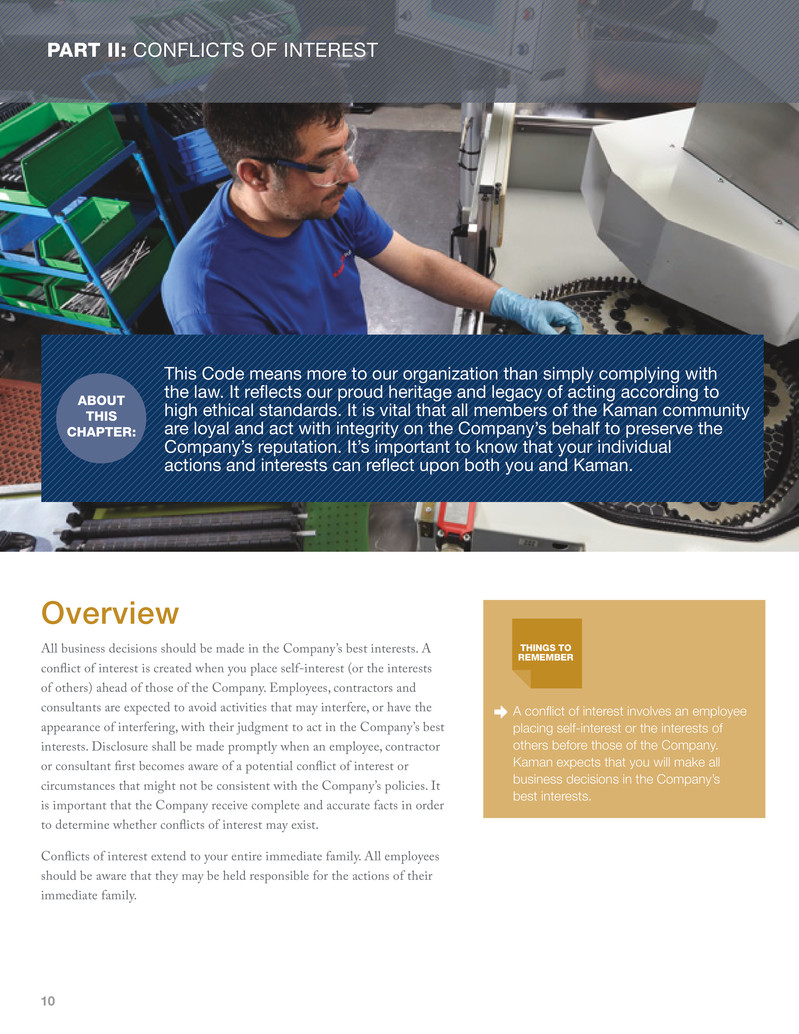
10 All business decisions should be made in the Company’s best interests. A conflict of interest is created when you place self-interest (or the interests of others) ahead of those of the Company. Employees, contractors and consultants are expected to avoid activities that may interfere, or have the appearance of interfering, with their judgment to act in the Company’s best interests. Disclosure shall be made promptly when an employee, contractor or consultant first becomes aware of a potential conflict of interest or circumstances that might not be consistent with the Company’s policies. It is important that the Company receive complete and accurate facts in order to determine whether conflicts of interest may exist. Conflicts of interest extend to your entire immediate family. All employees should be aware that they may be held responsible for the actions of their immediate family. Overview ABOUT THIS CHAPTER: This Code means more to our organization than simply complying with the law. It reflects our proud heritage and legacy of acting according to high ethical standards. It is vital that all members of the Kaman community are loyal and act with integrity on the Company’s behalf to preserve the Company’s reputation. It’s important to know that your individual actions and interests can reflect upon both you and Kaman. PART II: CONFLICTS OF INTEREST A conflict of interest involves an employee placing self-interest or the interests of others before those of the Company. Kaman expects that you will make all business decisions in the Company’s best interests. THINGS TO REMEMBER

11 For a list of Compliance Officers, visit www.kaman.com/investor-relations; click on “Corporate Governance” then “Company Compliance Officers.” Or call the Ethics Hotline at 1-866-450-3663. Reporting a Conflict of Interest You should review your personal and employment situations and take the following steps in any situation that might involve a potential conflict of interest or the appearance of a conflict: • Report the situation in writing to your supervisor; • Obtain written approval from your supervisor for the situation or (if the situation is not approved) written direction for resolving the conflict of interest; and • Should a situation arise that would constitute a “related-party transaction” under Securities and Exchange Commission regulations, the independent members of the Board of Directors will review the propriety of, and approve or disapprove, such transaction. All supervisors are required to maintain reasonable ongoing oversight after a potential conflict of interest has been reported or observed. Supervisors should ensure that their directions in the matter have been followed. Certain situations may involve difficult questions of judgment. You should discuss all situations which raise any question of a conflict of interest or a violation of ethical standards with your supervisor. If the conflict cannot be resolved or eliminated, discuss the matter with the Company Compliance Officer or the Corporate Legal Department. Where To Get More Information: Please refer any questions to your Company Compliance Officer or the Corporate Legal Department. Learn the steps to take if you believe you might be involved in a potential conflict of interest. Q&A What are some examples of conflicts of interest? It is not practical to list all circumstances which might raise ethical or conflict-of- interest questions, but some examples include: Conducting Company business with relatives; Holding a material interest in a supplier, contractor, customer, competitor, or acquisition target; Benefiting unfairly (or enabling another person to benefit unfairly) from the use or disposition of Company property or the conduct of Company business; and Taking advantage of inside information which is not otherwise available to the general public for any manner of personal gain. Situation. Sally, a Kaman employee, is a director and partial owner of a small business that sells services to Kaman. The volume of business conducted with Kaman is very low compared to other larger suppliers to Kaman. Must Sally disclose to Kaman her directorship and ownership in the business? Appropriate Response. Yes. Regardless of the low volume of business, Sally should promptly disclose to her supervisor or the Corporate Law Department both her directorship and ownership interest in the business along with any other relevant information. ILLUSTRATION PART II: CONFLICTS OF INTEREST

12 Corporate Opportunity Kaman expects your loyalty and that you will advance the Company’s legitimate interests when business opportunities arise, or where there is an expectation that the opportunity is of interest to the Company. Employees and contractors should not; • Personally take advantage of opportunities that properly belong to the Company; • Personally take advantage of opportunities which are discovered through the use of Company property, information or position; • Use company property, information or position inappropriately for personal gain; or • Compete with the Company. Personally taking an opportunity also includes taking advantage of the opportunity for another person, such as a family member or friend. Where To Get More Information: Please bring questions about this area to your Human Resources representative, your supervisor or your Company Compliance Officer. Q&A What is your duty of loyalty as a Kaman employee? Kaman expects that you will act in the Company’s best interests whenever a business opportunity arises. This means not taking for yourself opportunities that properly belong to the Company. Situation. Tim’s friend owns a business that buys equipment from Kaman. Tim gave the friend a deal by reducing the profit margin on the item. The reduction was significantly below what Kaman charges others for the item. The Company still realized a profit, but much smaller than ordinarily would have been the case. Was it appropriate for Tim to have given the discount? Appropriate Response. The motivation and reason for the discount must be examined. If it was given solely because of Tim’s friendship with the customer, then Tim breached his duty of loyalty by giving a corporate opportunity to another. If Tim thought the discount was necessary to make an arms-length sale, Tim should have disclosed all of the facts to his supervisor and sought guidance. Contact your Human Resources representative to report inappropriate behavior or to discuss concerns. ILLUSTRATION PART II: CONFLICTS OF INTEREST

13 For a list of Compliance Officers, visit www.kaman.com/investor-relations; click on “Corporate Governance” then “Company Compliance Officers.” Or call the Ethics Hotline at 1-866-450-3663. ABOUT THIS CHAPTER: Employees must follow applicable laws and related Company policies. This section provides a brief overview of the laws particularly important to Kaman’s operations. PART III: COMPLIANCE WITH APPLICABLE LAWS AND POLICIES You may sign many documents in your day-to-day job duties, including some documents that require sworn statements. Knowingly making false statements under oath not only violates Company policy, but also may have criminal and civil consequences. Engaging in a scheme to defraud anyone violates the Code and the law. Committing fraud can result in severe legal penalties and disciplinary action, up to and including termination of employment. Where To Get More Information: Contact your Company Compliance Officer or the Corporate Legal Department. False Statements and Schemes to Defraud It’s against the law and Kaman policy to knowingly make a false statement.

14 Accounting The Company is required to keep its books, records and accounts so that they accurately and fairly reflect all of the Company’s transactions. Our policy is to fully account for all assets, liabilities, income and expenses and record such items in the Company’s books. Financial statements are prepared according to Generally Accepted Accounting Principles and in compliance with other applicable rules, regulations and criteria. The Company will not approve the following: • Establishing an unrecorded fund or asset, regardless of the purposes for which it may have been intended; • Improper or inaccurate entries knowingly made in the Company’s books and records; • Payment made with the intention, understanding or awareness that it would be used for a different purpose than described by the supporting documents; or • A payment or a transaction not made for a proper, lawful or authorized purpose. Where To Get More Information: Contact your Company Compliance Officer, the Ethics Hotline at 1-866-450-3663 or the Corporate Legal Department. Audits and Internal Investigations All employees are expected to fully cooperate in any audit or investigation being conducted by Kaman’s internal or independent auditors, the Company’s Corporate Legal Department, or any other company-retained consultants or advisors used in an audit or investigation. It is against Company policy to improperly influence, coerce, manipulate, or mislead any person who is engaged to perform an audit or investigation. Where To Get More Information: Contact your Company Compliance Officer, the Ethics Hotline at 1-866-450-3663 or the Corporate Legal Department. We accurately account for and record all financial transactions. Employees should cooperate fully with audits. PART III: COMPLIANCE WITH APPLICABLE LAWS AND POLICIES

15 For a list of Compliance Officers, visit www.kaman.com/investor-relations; click on “Corporate Governance” then “Company Compliance Officers.” Or call the Ethics Hotline at 1-866-450-3663. Cooperation with Legal and Regulatory Investigations The Company’s policy is to cooperate with all proper governmental investigations, law enforcement officials and regulators. All inquiries or requests for information from investigators should be immediately referred to the Corporate Legal Department. Depending on the nature of the investigation, the Corporate Legal Department will coordinate responses to the investigator’s questions or coordinate the matter with the responsible department or business unit for a response. Failure to cooperate with a proper investigation will result in disciplinary action, up to and including termination of employment. Where To Get More Information: Contact the Corporate Legal Department or the Ethics Hotline at 1-866-450-3663 with any questions. Environmental Compliance The Company intends to conduct its business in compliance with applicable environmental protection laws and regulations. Each of us has the responsibility to ensure this policy is carried out. Environmental violations, even if unintentional, can carry severe penalties and could result in criminal prosecution of both the employees involved and the Company. The complexity of environmental laws and their impact can be significant. To assist employees, Kaman has prepared the Kaman Environmental Compliance Guide which outlines the laws and their requirements in the United States. Refer to the Guide for detailed information about complying with environmental laws. For questions about environmental compliance outside of the United States, contact your Company Compliance Officer, the Corporate Environmental Health and Safety Department, or the Corporate Legal Department. Q&A Employees are expected to cooperate with investigations and law enforcement professionals. Immediately refer all inquiries from law enforcement or regulators to the Corporate Law Department. The Kaman Environmental Compliance Guide outlines specific environmental laws that affect the company. Where should I refer inquiries from governmental regulators or investigators? Promptly refer inquiries to the Corporate Legal Department, which will coordinate responses to external investigators’ questions or assign the matter to the responsible department or business unit for a response. Environmental compliance today will help avoid environmental problems and liabilities in the future. To learn more about compliance with environmental laws, review the Kaman Environmental Compliance Guide. Contact your Company Compliance Of- ficer, the Corporate Environmental Health and Safety Department, or the Corporate Legal Department about environmental compliance questions. THINGS TO REMEMBER PART III: COMPLIANCE WITH APPLICABLE LAWS AND POLICIES
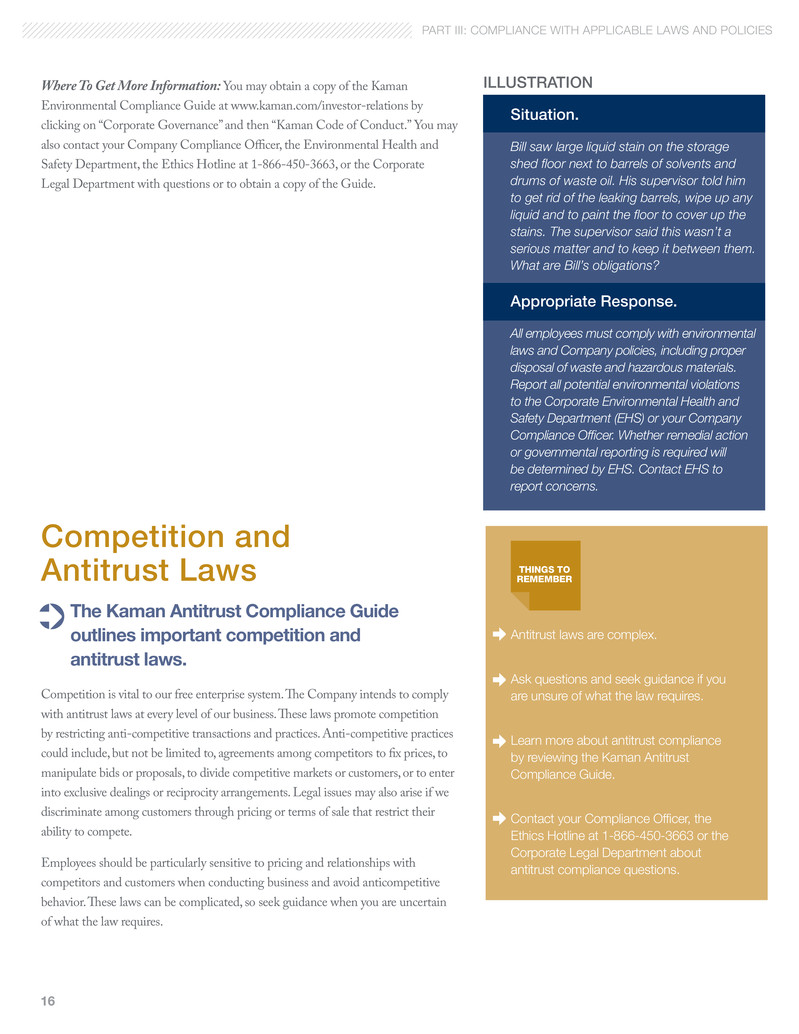
16 Where To Get More Information: You may obtain a copy of the Kaman Environmental Compliance Guide at www.kaman.com/investor-relations by clicking on “Corporate Governance” and then “Kaman Code of Conduct.” You may also contact your Company Compliance Officer, the Environmental Health and Safety Department, the Ethics Hotline at 1-866-450-3663, or the Corporate Legal Department with questions or to obtain a copy of the Guide. Competition and Antitrust Laws Competition is vital to our free enterprise system. The Company intends to comply with antitrust laws at every level of our business. These laws promote competition by restricting anti-competitive transactions and practices. Anti-competitive practices could include, but not be limited to, agreements among competitors to fix prices, to manipulate bids or proposals, to divide competitive markets or customers, or to enter into exclusive dealings or reciprocity arrangements. Legal issues may also arise if we discriminate among customers through pricing or terms of sale that restrict their ability to compete. Employees should be particularly sensitive to pricing and relationships with competitors and customers when conducting business and avoid anticompetitive behavior. These laws can be complicated, so seek guidance when you are uncertain of what the law requires. Antitrust laws are complex. Ask questions and seek guidance if you are unsure of what the law requires. Learn more about antitrust compliance by reviewing the Kaman Antitrust Compliance Guide. Contact your Compliance Officer, the Ethics Hotline at 1-866-450-3663 or the Corporate Legal Department about antitrust compliance questions. THINGS TO REMEMBER Situation. Bill saw large liquid stain on the storage shed floor next to barrels of solvents and drums of waste oil. His supervisor told him to get rid of the leaking barrels, wipe up any liquid and to paint the floor to cover up the stains. The supervisor said this wasn’t a serious matter and to keep it between them. What are Bill’s obligations? Appropriate Response. All employees must comply with environmental laws and Company policies, including proper disposal of waste and hazardous materials. Report all potential environmental violations to the Corporate Environmental Health and Safety Department (EHS) or your Company Compliance Officer. Whether remedial action or governmental reporting is required will be determined by EHS. Contact EHS to report concerns. ILLUSTRATION The Kaman Antitrust Compliance Guide outlines important competition and antitrust laws. PART III: COMPLIANCE WITH APPLICABLE LAWS AND POLICIES

17 For a list of Compliance Officers, visit www.kaman.com/investor-relations; click on “Corporate Governance” then “Company Compliance Officers.” Or call the Ethics Hotline at 1-866-450-3663. Because antitrust laws are complex and their impact can be significant, the Company has prepared the Kaman Antitrust Compliance Guide. The Guide summarizes sig- nificant antitrust laws and their requirements, and should be referred to by employees so that they are knowledgeable about what the law requires. If your job brings you into contact with this type of concern, and particularly if you are in a sales or business development function, you should read and understand the Guide. Where To Get More Information: You may obtain a copy of the Kaman Antitrust Compliance Guide at www.kaman.com/investor-relations by clicking on “Corporate Governance” and then “Kaman Code of Conduct.” You may also contact your Company Compliance Officer, the Ethics Hotline at 1-866-450-3663 or the Corporate Legal Department with questions or to obtain a copy of the Guide. Employment Laws Kaman is committed to a workplace in which employees treat others with respect and dignity. Diversity of backgrounds, cultures, abilities, and perspectives strengthens us as an organization and fosters employee engagement, creativity, and a positive work environment. Guiding Principles • We set high ethical expectations for ourselves. • We expect our co-workers to perform their jobs with integrity and to comply with all applicable laws and Company rules. • Employees may in good faith ask questions or make comments or complaints without fear of reprisals. • Managers should strive to be role models who exhibit high ethical standards. • Managers are expected to act promptly to address and report illegal, unethical or other nonconforming incidents to their Human Resources representative, Company Compliance Officer or the Corporate Legal Department. Discrimination We strive to provide equal employment opportunities so that all employees have the chance to advance and grow professionally. We do not discriminate against employees or applicants based on age, gender, race, color, national origin, ethnic- ity, sexual orientation, physical or mental disability, religion, veteran status, or other protected class status. Where To Get More Information: Contact your supervisor, your Company Compliance Officer, or your Human Resources representative. Situation. I frequently attend trade association meetings as part of my job. These meetings are also attended by Kaman’s competitors. What are the restrictions for discussing price-related matters among competitors? Appropriate Response. You should never discuss prices, bids, terms, contract awards or related business information with our competitors. Situation. I applied for, but did not receive, a new position with the Company. I feel that I was qualified for the job. Have I been discriminated against? Appropriate Response. Speak with your supervisor to discuss the qualifications and requirements for the position. If you are uncomfortable addressing your concerns with your supervisor or you do not receive the information you have requested, contact your Human Resources representative. ILLUSTRATION ILLUSTRATION PART III: COMPLIANCE WITH APPLICABLE LAWS AND POLICIES
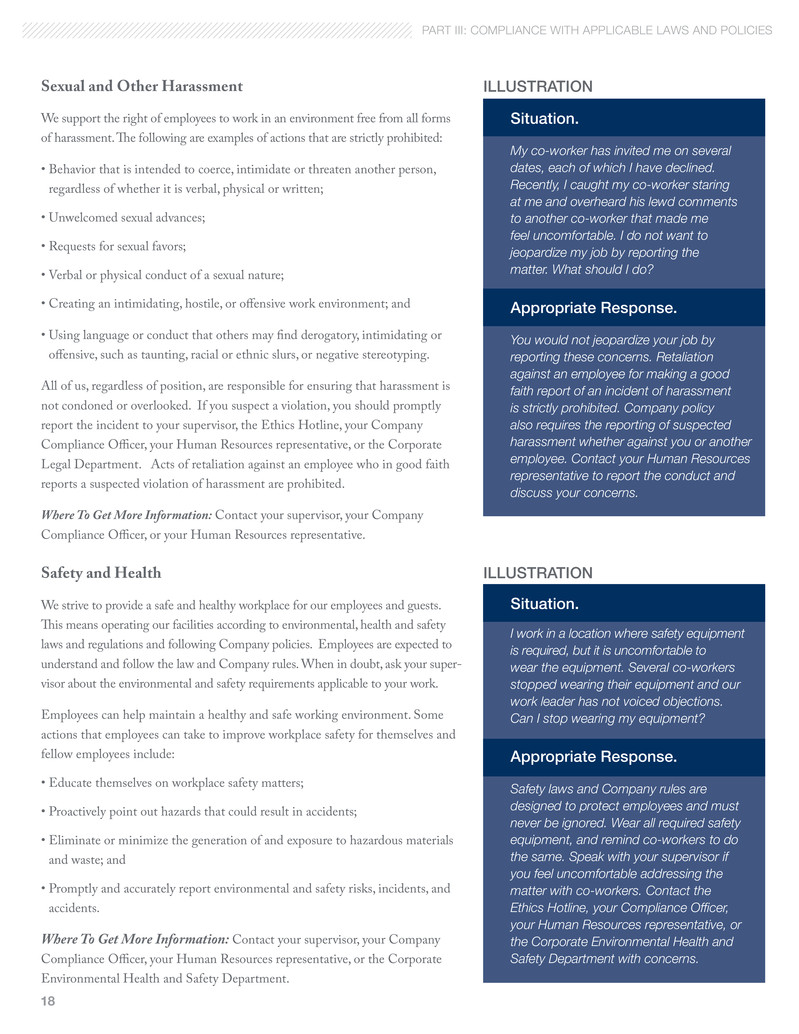
18 Sexual and Other Harassment We support the right of employees to work in an environment free from all forms of harassment. The following are examples of actions that are strictly prohibited: • Behavior that is intended to coerce, intimidate or threaten another person, regardless of whether it is verbal, physical or written; • Unwelcomed sexual advances; • Requests for sexual favors; • Verbal or physical conduct of a sexual nature; • Creating an intimidating, hostile, or offensive work environment; and • Using language or conduct that others may find derogatory, intimidating or offensive, such as taunting, racial or ethnic slurs, or negative stereotyping. All of us, regardless of position, are responsible for ensuring that harassment is not condoned or overlooked. If you suspect a violation, you should promptly report the incident to your supervisor, the Ethics Hotline, your Company Compliance Officer, your Human Resources representative, or the Corporate Legal Department. Acts of retaliation against an employee who in good faith reports a suspected violation of harassment are prohibited. Where To Get More Information: Contact your supervisor, your Company Compliance Officer, or your Human Resources representative. Safety and Health We strive to provide a safe and healthy workplace for our employees and guests. This means operating our facilities according to environmental, health and safety laws and regulations and following Company policies. Employees are expected to understand and follow the law and Company rules. When in doubt, ask your super- visor about the environmental and safety requirements applicable to your work. Employees can help maintain a healthy and safe working environment. Some actions that employees can take to improve workplace safety for themselves and fellow employees include: • Educate themselves on workplace safety matters; • Proactively point out hazards that could result in accidents; • Eliminate or minimize the generation of and exposure to hazardous materials and waste; and • Promptly and accurately report environmental and safety risks, incidents, and accidents. Where To Get More Information: Contact your supervisor, your Company Compliance Officer, your Human Resources representative, or the Corporate Environmental Health and Safety Department. Situation. My co-worker has invited me on several dates, each of which I have declined. Recently, I caught my co-worker staring at me and overheard his lewd comments to another co-worker that made me feel uncomfortable. I do not want to jeopardize my job by reporting the matter. What should I do? Appropriate Response. You would not jeopardize your job by reporting these concerns. Retaliation against an employee for making a good faith report of an incident of harassment is strictly prohibited. Company policy also requires the reporting of suspected harassment whether against you or another employee. Contact your Human Resources representative to report the conduct and discuss your concerns. Situation. I work in a location where safety equipment is required, but it is uncomfortable to wear the equipment. Several co-workers stopped wearing their equipment and our work leader has not voiced objections. Can I stop wearing my equipment? Appropriate Response. Safety laws and Company rules are designed to protect employees and must never be ignored. Wear all required safety equipment, and remind co-workers to do the same. Speak with your supervisor if you feel uncomfortable addressing the matter with co-workers. Contact the Ethics Hotline, your Compliance Officer, your Human Resources representative, or the Corporate Environmental Health and Safety Department with concerns. ILLUSTRATION ILLUSTRATION PART III: COMPLIANCE WITH APPLICABLE LAWS AND POLICIES

19 For a list of Compliance Officers, visit www.kaman.com/investor-relations; click on “Corporate Governance” then “Company Compliance Officers.” Or call the Ethics Hotline at 1-866-450-3663. Workplace Violence Workplace violence, abuse, intimidation, or offensive conduct in any form is prohib- ited. Threatening or committing an abusive or violent act will be subject to disciplin- ary action, up to and including discharge. Such prohibited actions include, but are not limited to: • Threatening physical violence; • Fighting; • Bringing a weapon to work; or • Intentionally damaging personal property. Where To Get More Information: Contact your supervisor, your Company Compliance Officer, your Human Resources representative, or the Corporate Legal Department. Substance and Alcohol Abuse Employees who are impaired or under the influence of drugs, alcohol, or substances at work can create an unsafe work environment. The use, sale, or possession of controlled substances (except for the proper use of medically prescribed drugs) is prohibited. Employees are subject to and must cooperate with any legal Company searches for alcohol, drugs, or other controlled substances. Promptly report any person who appears to be impaired or working under the influence of alcohol, drugs, or other substances. Where To Get More Information: Contact your supervisor, your Company Compliance Officer, or your Human Resources representative. Human Rights We strive to comply with the employment laws of each country in which the Company operates or conducts business. The use of forced, child, or slave labor is not allowed, nor is the abuse or physical punishment of any person providing services to or on behalf of the Company. The compensation paid to workers and working conditions must meet or exceed the legal requirements for each applicable jurisdiction. We expect all employees, contractors and suppliers to abide by these principles. Where To Get More Information: Contact your supervisor, your Company Compliance Officer, your Human Resources representative, or the Corporate Legal Department. PART III: COMPLIANCE WITH APPLICABLE LAWS AND POLICIES

20 Labor Activity We strive to comply with the labor laws of each country in which the Company operates or conducts business. In order to preserve the “open door” nature of the employment relationship, it is the Company’s policy to maintain a union-free working environment for its employees and to preclude, to the fullest extent permitted by law, the intervention of organized labor in the workplace. The Company does not believe any employee should have to pay any labor union in order to be treated fairly and as individuals. In this regard, managers and supervisory personnel of all subsidiaries and operating units should be particularly sensitive to any indications or signals that union organizers may be attempting to communicate with employees. In situations where management has any reason to believe that organizing activities may be occurring (even mere rumblings from employees about a labor union) the Corporate Legal De- partment should be contacted immediately. By addressing the situation at the earliest possible stage, the Company will be in a better position to address employee concerns. Where To Get More Information: Contact your Company Compliance Officer, your Human Resources representative, or the Corporate Legal Department. Government Contracts The Company supplies products and services to the United States Government and to state, local and foreign governments. Numerous laws, regulations and con- tract requirements apply when the government is our customer. Keep the following in mind when dealing with the government as a customer: • Comply with contract terms and deliver the goods and services as promised. • Accurately and truthfully report all required information, including expenses, cost and pricing data, quality inspections and testing, specification compliance and subcontractor or supplier cost and pricing data. • Do not certify tests that have not been completed. • Do not substitute materials or change testing or quality control requirements unless approved by governmental procedures. • Perform tests according to the contract, and document how the company has met its contractual obligations. • Charge labor costs to only the proper government contract. • Deal with suppliers and subcontractors in a fair and reasonable manner consistent with the laws and good business practices. • When handling classified information, follow applicable rules and regulations. • Follow the Company’s policies and procedures regarding government contracting. Where To Get More Information: Contact the Corporate Legal Department or the Ethics Hotline at 1-866-450-3663. Accurately and truthfully report all financial, cost and quality inspection information. Deal with suppliers and subcontractors fairly, consistent with the law and Company policies. Treat classified information with care and according to legal requirements. THINGS TO REMEMBER PART III: COMPLIANCE WITH APPLICABLE LAWS AND POLICIES
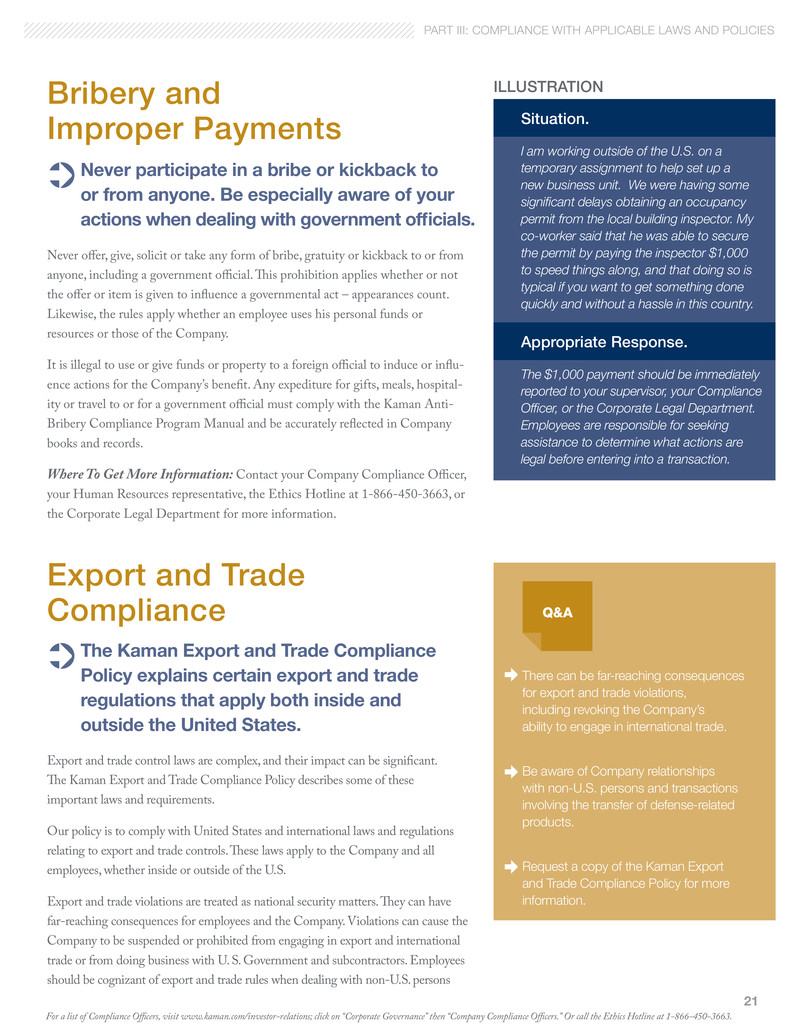
21 For a list of Compliance Officers, visit www.kaman.com/investor-relations; click on “Corporate Governance” then “Company Compliance Officers.” Or call the Ethics Hotline at 1-866-450-3663. Bribery and Improper Payments Never offer, give, solicit or take any form of bribe, gratuity or kickback to or from anyone, including a government official. This prohibition applies whether or not the offer or item is given to influence a governmental act – appearances count. Likewise, the rules apply whether an employee uses his personal funds or resources or those of the Company. It is illegal to use or give funds or property to a foreign official to induce or influ- ence actions for the Company’s benefit. Any expediture for gifts, meals, hospital- ity or travel to or for a government official must comply with the Kaman Anti- Bribery Compliance Program Manual and be accurately reflected in Company books and records. Where To Get More Information: Contact your Company Compliance Officer, your Human Resources representative, the Ethics Hotline at 1-866-450-3663, or the Corporate Legal Department for more information. Export and Trade Compliance Export and trade control laws are complex, and their impact can be significant. The Kaman Export and Trade Compliance Policy describes some of these important laws and requirements. Our policy is to comply with United States and international laws and regulations relating to export and trade controls. These laws apply to the Company and all employees, whether inside or outside of the U.S. Export and trade violations are treated as national security matters. They can have far-reaching consequences for employees and the Company. Violations can cause the Company to be suspended or prohibited from engaging in export and international trade or from doing business with U. S. Government and subcontractors. Employees should be cognizant of export and trade rules when dealing with non-U.S. persons Never participate in a bribe or kickback to or from anyone. Be especially aware of your actions when dealing with government officials. Situation. I am working outside of the U.S. on a temporary assignment to help set up a new business unit. We were having some significant delays obtaining an occupancy permit from the local building inspector. My co-worker said that he was able to secure the permit by paying the inspector $1,000 to speed things along, and that doing so is typical if you want to get something done quickly and without a hassle in this country. Appropriate Response. The $1,000 payment should be immediately reported to your supervisor, your Compliance Officer, or the Corporate Legal Department. Employees are responsible for seeking assistance to determine what actions are legal before entering into a transaction. ILLUSTRATION The Kaman Export and Trade Compliance Policy explains certain export and trade regulations that apply both inside and outside the United States. Q&A There can be far-reaching consequences for export and trade violations, including revoking the Company’s ability to engage in international trade. Be aware of Company relationships with non-U.S. persons and transactions involving the transfer of defense-related products. Request a copy of the Kaman Export and Trade Compliance Policy for more information. PART III: COMPLIANCE WITH APPLICABLE LAWS AND POLICIES

22 and transactions involving the transfer of restricted or defense-related products, technology or information. The Company’s Export and Trade Compliance Policy is located on the Kaman intranet site. To view, click on the “Kaman Corporate” tab, followed by the “Legal” tab and then click on the “Trade Compliance Policy” link. A copy of the Policy may also be obtained from your Human Resources representative or the Corporate Legal Department. Where To Get More Information: Contact your Export Control Official, the Corporate Export and Trade Compliance Office, a Company Compliance Officer, the Ethics Hotline at 1-866-450-3663, or the Corporate Legal Department with questions or to obtain a copy of the Kaman Export and Trade Compliance Policy. Gifts, Meals, and Entertainment Members of the Kaman community may not give or accept gifts, meals entertain- ment, or other gratuities in order to influence a business decision or if doing so would create the appearance of a conflict of interest. Bribes and payoffs are always prohibited, as are extravagant, inappropriate, or frequent gifts or entertainment even if they are acceptable by local custom. Members of the Kaman community are pro- hibited from requesting gifts, meals, entertainment, contributions, services, gratuities and items of a similar nature from suppliers, vendors, customers, or the Company. Cash and cash equivalents are never acceptable gifts to or from a customer, supplier, or other party doing or seeking to do business with the Company. All members of the Kaman community are expected to understand the applicable prohibitions and limitations before offering or receiving gifts, meals, entertainment, or other gratuities. Meals, gifts, entertainment and gratuities that you receive or give must comply with Company policy. Such items must be legal, reasonable in nature, nominal in value, and received or given infrequently. In addition, the receipt or giving of such items must be consistent with customary business practices and be reasonably related to the business relationship. Receiving Gifts, Meals, Entertainment, and Gratuities The table on the following page identifies the Company’s approval requirements for the receipt of gifts, meals, entertainment, and similar gratuities. You are respon- sible for reasonably documenting and maintaining records of your receipt of such items and are required to produce such records when requested by your supervisor, a member of management, your Company Compliance Officer, your Human Re- sources representative, or the Corporate Legal Department. Business units within the Company may establish more restrictive guidelines than those set forth below. Please contact your supervisor, your Company Compliance Officer, or your Human Resources representative about such requirements. PART III: COMPLIANCE WITH APPLICABLE LAWS AND POLICIES

23 For a list of Compliance Officers, visit www.kaman.com/investor-relations; click on “Corporate Governance” then “Company Compliance Officers.” Or call the Ethics Hotline at 1-866-450-3663. Who Must Approve the Item No Approval Necessary† Your Vice Pres. for Reporting or Division Vice Pres. of Finance† Chief Compliance Officer† Meals and Refreshments $250 or less per employee per year from a single source or organization ‡ $251 - $1,000 ‡ Over $1,000 ‡ Gifts – Other than Cash, Cash Equivalents, Gift Cards or Services (e.g., Promotional Items) $250 or less per employee per year from a single source or organization ‡ $251 - $1,000 ‡ Over $1,000 ‡ Gifts of Services or Use of Property (e.g., Attendance at a Conference) Value of services or use of property $250 or less per employee per year from a single source or organization ‡ $251 - $1,000 ‡ Over $1,000 ‡ Gifts of Cash and Cash Equivalents Not allowed Not allowed Over $1,000 ‡ Presentations of a Ceremonial Nature Value of items $250 or less per year from a single source or organization ‡ $251 - $1,000 ‡ Over $1,000 ‡ Entertainment (e.g., tickets to sporting or concert event, amusement parks, golf outings and similar type entertainment) $250 or less in value per employee per year from a single source or organization ‡ $251 - $1,000 ‡ Over $1,000 ‡ Travel and Lodging $250 or less in value per employee per year from a single source or organization ‡ $251 - $1,000 ‡ Over $1,000 ‡ † Approval should be obtained in advance when possible; however, approval may be sought and granted retroactively when appropriate or when pre-approval is not possible or practical. Values are shown in U.S. dollars. If a different currency is used, the converted amount must not exceed the U.S. dollar limitation unless permission is received from the Chief Compliance Officer. ‡ Must be legal, reasonable, non-extravagant, infrequent, and for a proper business purpose that does not create (or appear to create) a conflict of interest. Receiving Gifts, Meals and Entertainment PART III: COMPLIANCE WITH APPLICABLE LAWS AND POLICIES
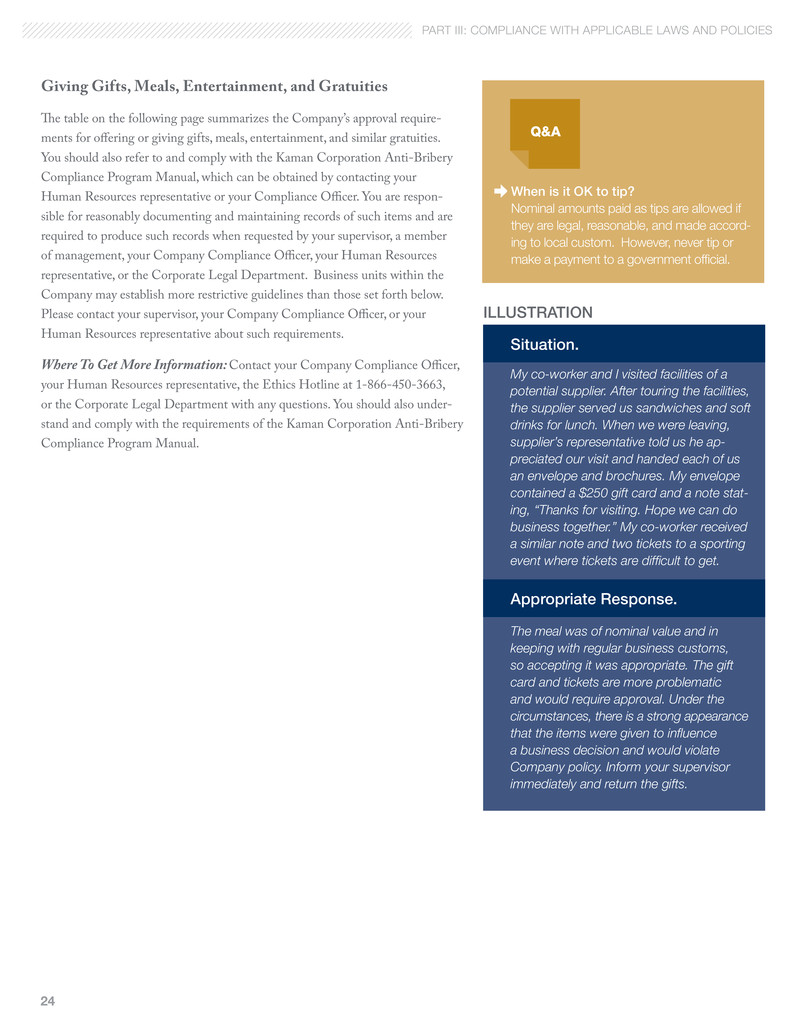
24 Giving Gifts, Meals, Entertainment, and Gratuities The table on the following page summarizes the Company’s approval require- ments for offering or giving gifts, meals, entertainment, and similar gratuities. You should also refer to and comply with the Kaman Corporation Anti-Bribery Compliance Program Manual, which can be obtained by contacting your Human Resources representative or your Compliance Officer. You are respon- sible for reasonably documenting and maintaining records of such items and are required to produce such records when requested by your supervisor, a member of management, your Company Compliance Officer, your Human Resources representative, or the Corporate Legal Department. Business units within the Company may establish more restrictive guidelines than those set forth below. Please contact your supervisor, your Company Compliance Officer, or your Human Resources representative about such requirements. Where To Get More Information: Contact your Company Compliance Officer, your Human Resources representative, the Ethics Hotline at 1-866-450-3663, or the Corporate Legal Department with any questions. You should also under- stand and comply with the requirements of the Kaman Corporation Anti-Bribery Compliance Program Manual. Q&A When is it OK to tip? Nominal amounts paid as tips are allowed if they are legal, reasonable, and made accord- ing to local custom. However, never tip or make a payment to a government official. Situation. My co-worker and I visited facilities of a potential supplier. After touring the facilities, the supplier served us sandwiches and soft drinks for lunch. When we were leaving, supplier’s representative told us he ap- preciated our visit and handed each of us an envelope and brochures. My envelope contained a $250 gift card and a note stat- ing, “Thanks for visiting. Hope we can do business together.” My co-worker received a similar note and two tickets to a sporting event where tickets are difficult to get. Appropriate Response. The meal was of nominal value and in keeping with regular business customs, so accepting it was appropriate. The gift card and tickets are more problematic and would require approval. Under the circumstances, there is a strong appearance that the items were given to influence a business decision and would violate Company policy. Inform your supervisor immediately and return the gifts. ILLUSTRATION PART III: COMPLIANCE WITH APPLICABLE LAWS AND POLICIES
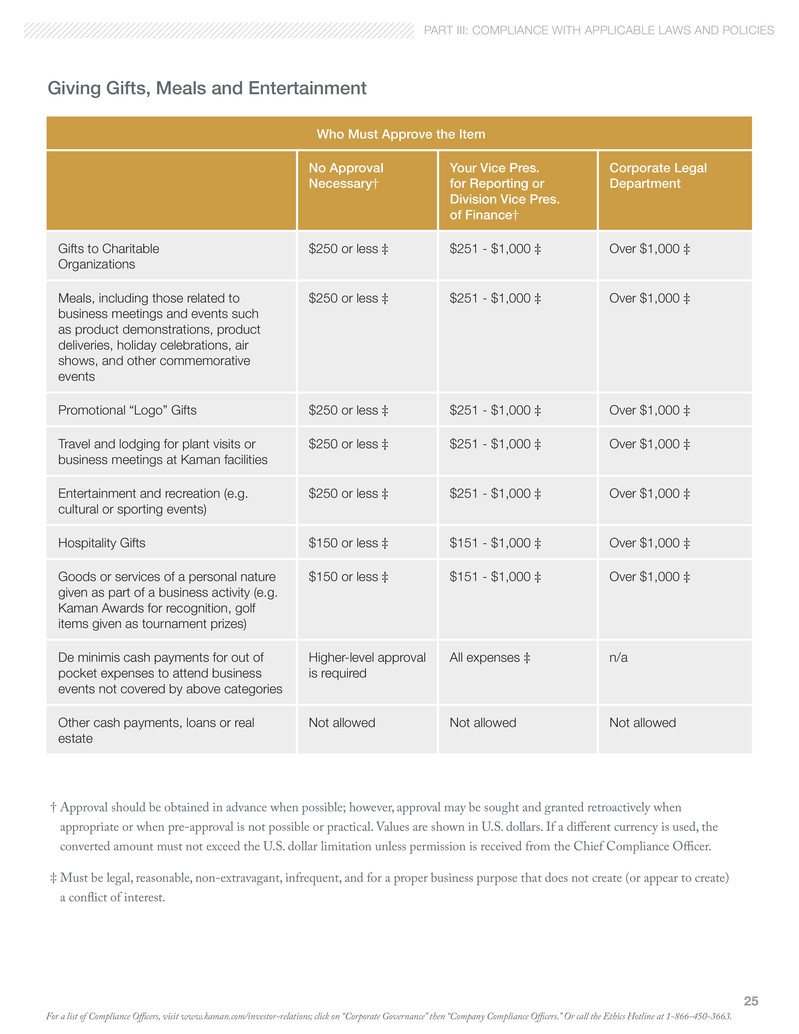
25 For a list of Compliance Officers, visit www.kaman.com/investor-relations; click on “Corporate Governance” then “Company Compliance Officers.” Or call the Ethics Hotline at 1-866-450-3663. Who Must Approve the Item No Approval Necessary† Your Vice Pres. for Reporting or Division Vice Pres. of Finance† Corporate Legal Department Gifts to Charitable Organizations $250 or less ‡ $251 - $1,000 ‡ Over $1,000 ‡ Meals, including those related to business meetings and events such as product demonstrations, product deliveries, holiday celebrations, air shows, and other commemorative events $250 or less ‡ $251 - $1,000 ‡ Over $1,000 ‡ Promotional “Logo” Gifts $250 or less ‡ $251 - $1,000 ‡ Over $1,000 ‡ Travel and lodging for plant visits or business meetings at Kaman facilities $250 or less ‡ $251 - $1,000 ‡ Over $1,000 ‡ Entertainment and recreation (e.g. cultural or sporting events) $250 or less ‡ $251 - $1,000 ‡ Over $1,000 ‡ Hospitality Gifts $150 or less ‡ $151 - $1,000 ‡ Over $1,000 ‡ Goods or services of a personal nature given as part of a business activity (e.g. Kaman Awards for recognition, golf items given as tournament prizes) $150 or less ‡ $151 - $1,000 ‡ Over $1,000 ‡ De minimis cash payments for out of pocket expenses to attend business events not covered by above categories Higher-level approval is required All expenses ‡ n/a Other cash payments, loans or real estate Not allowed Not allowed Not allowed † Approval should be obtained in advance when possible; however, approval may be sought and granted retroactively when appropriate or when pre-approval is not possible or practical. Values are shown in U.S. dollars. If a different currency is used, the converted amount must not exceed the U.S. dollar limitation unless permission is received from the Chief Compliance Officer. ‡ Must be legal, reasonable, non-extravagant, infrequent, and for a proper business purpose that does not create (or appear to create) a conflict of interest. Giving Gifts, Meals and Entertainment PART III: COMPLIANCE WITH APPLICABLE LAWS AND POLICIES

26 Political Contributions Our policy is that employees shall comply with political campaign finance and ethics laws. Federal law and Company policy prohibit using Company assets on behalf of a federal political party or candidate. In addition, there are other political laws that ap- ply to company segments doing business with the U.S. Department of Defense. The Company policy is not intended to discourage or prohibit employees from voluntari- ly engaging in the political process on their own time or by making personal political contributions. However, employees must ensure that their actions do not create the appearance of a Company activity. The Company has established Political Action Committees (“PACs”) as permit- ted by law. PACs may lawfully make contributions to candidates for public office. Neither the Company nor the PACs may compensate or reimburse employees for contributions to the PACs. Employee contributions to the PACs are strictly volun- tary and are not tax-deductible. No employee will be prejudiced for not contributing to the PACs. The Company’s Political Contributions Policy is located on the Kaman intranet site. Click on the “Kaman Corporate” tab, followed by the “Legal” tab and then click on the link to “Political Contributions.” A copy of the Policy also may be obtained from your Human Resources representative or the Corporate Legal Department. Where To Get More Information: Contact your Company Compliance Officer, the Ethics Hotline at 1-866-450-3663, or the Corporate Legal Department. You may make personal political contributions to candidates of your choice, provided they comply with the law and you do so individually and not on behalf of the Company. Situation. My spouse is running for election for a seat on our local school board. I would like to support her by encouraging my co-workers to vote for her. May I hand out brochures, buttons and small trinkets at work to pro- mote my spouse’s candidacy? Appropriate Response. Employees are free to support personal political activities, including those of relatives or friends. However, employees may not campaign at the Company’s facilities or dur- ing work time. Using company property such as computers, email, copiers or supplies in such political activities is prohibited. ILLUSTRATION Comply with all campaign finance and ethics laws. Do not use Company assets on behalf of a political party or candidate. Government contractors may be limited regarding political contributions. For example, Connecticut state law prohibits certain state government contractors and their directors and officers from making political contributions to candidates running for statewide and state legislative offices. It is illegal for the Company to compensate employees for political contributions. All political contributions are voluntary and not tax-deductible. You may participate in the political process and make personal political contributions, provided you do so on your own behalf and not as a representative of the Company. THINGS TO REMEMBER PART III: COMPLIANCE WITH APPLICABLE LAWS AND POLICIES
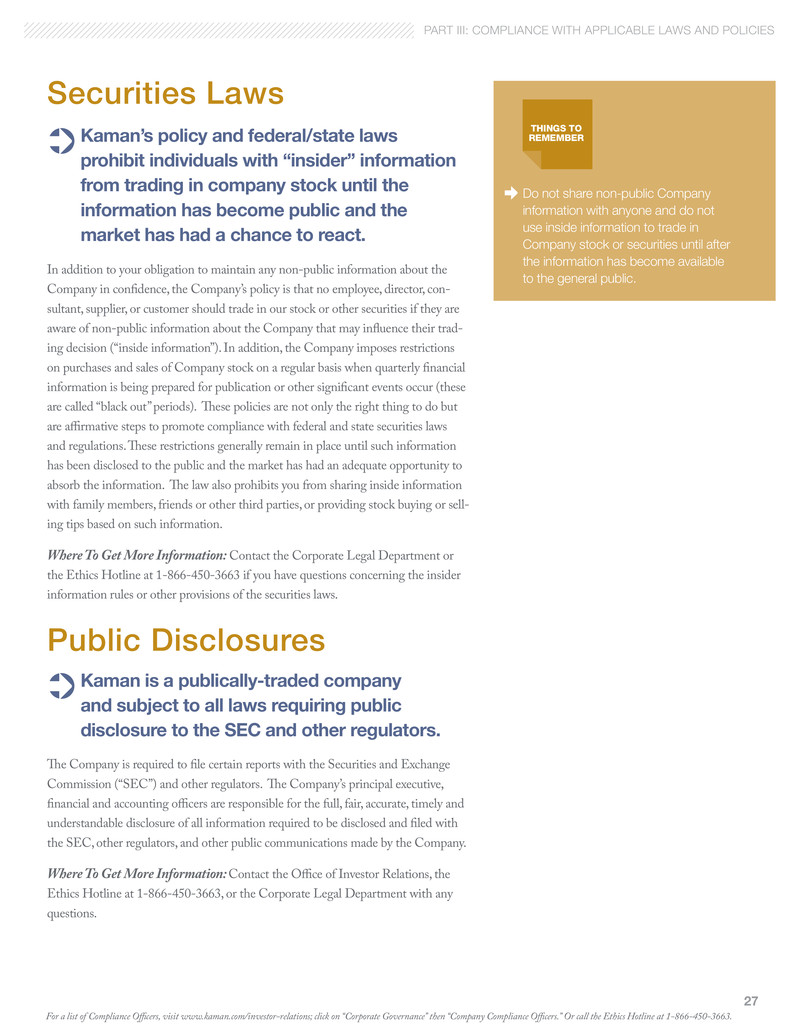
27 For a list of Compliance Officers, visit www.kaman.com/investor-relations; click on “Corporate Governance” then “Company Compliance Officers.” Or call the Ethics Hotline at 1-866-450-3663. Securities Laws In addition to your obligation to maintain any non-public information about the Company in confidence, the Company’s policy is that no employee, director, con- sultant, supplier, or customer should trade in our stock or other securities if they are aware of non-public information about the Company that may influence their trad- ing decision (“inside information”). In addition, the Company imposes restrictions on purchases and sales of Company stock on a regular basis when quarterly financial information is being prepared for publication or other significant events occur (these are called “black out” periods). These policies are not only the right thing to do but are affirmative steps to promote compliance with federal and state securities laws and regulations. These restrictions generally remain in place until such information has been disclosed to the public and the market has had an adequate opportunity to absorb the information. The law also prohibits you from sharing inside information with family members, friends or other third parties, or providing stock buying or sell- ing tips based on such information. Where To Get More Information: Contact the Corporate Legal Department or the Ethics Hotline at 1-866-450-3663 if you have questions concerning the insider information rules or other provisions of the securities laws. Public Disclosures The Company is required to file certain reports with the Securities and Exchange Commission (“SEC”) and other regulators. The Company’s principal executive, financial and accounting officers are responsible for the full, fair, accurate, timely and understandable disclosure of all information required to be disclosed and filed with the SEC, other regulators, and other public communications made by the Company. Where To Get More Information: Contact the Office of Investor Relations, the Ethics Hotline at 1-866-450-3663, or the Corporate Legal Department with any questions. Kaman’s policy and federal/state laws prohibit individuals with “insider” information from trading in company stock until the information has become public and the market has had a chance to react. Kaman is a publically-traded company and subject to all laws requiring public disclosure to the SEC and other regulators. Do not share non-public Company information with anyone and do not use inside information to trade in Company stock or securities until after the information has become available to the general public. THINGS TO REMEMBER PART III: COMPLIANCE WITH APPLICABLE LAWS AND POLICIES
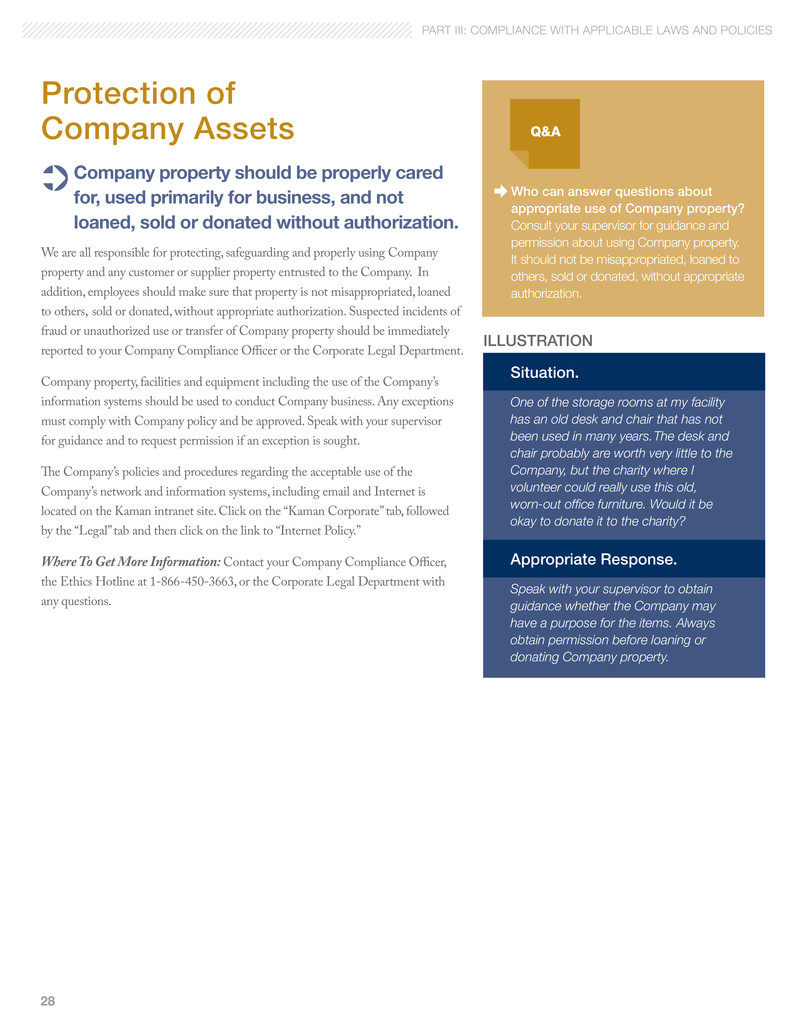
28 Protection of Company Assets We are all responsible for protecting, safeguarding and properly using Company property and any customer or supplier property entrusted to the Company. In addition, employees should make sure that property is not misappropriated, loaned to others, sold or donated, without appropriate authorization. Suspected incidents of fraud or unauthorized use or transfer of Company property should be immediately reported to your Company Compliance Officer or the Corporate Legal Department. Company property, facilities and equipment including the use of the Company’s information systems should be used to conduct Company business. Any exceptions must comply with Company policy and be approved. Speak with your supervisor for guidance and to request permission if an exception is sought. The Company’s policies and procedures regarding the acceptable use of the Company’s network and information systems, including email and Internet is located on the Kaman intranet site. Click on the “Kaman Corporate” tab, followed by the “Legal” tab and then click on the link to “Internet Policy.” Where To Get More Information: Contact your Company Compliance Officer, the Ethics Hotline at 1-866-450-3663, or the Corporate Legal Department with any questions. Company property should be properly cared for, used primarily for business, and not loaned, sold or donated without authorization. Q&A Who can answer questions about appropriate use of Company property? Consult your supervisor for guidance and permission about using Company property. It should not be misappropriated, loaned to others, sold or donated, without appropriate authorization. Situation. One of the storage rooms at my facility has an old desk and chair that has not been used in many years.The desk and chair probably are worth very little to the Company, but the charity where I volunteer could really use this old, worn-out office furniture. Would it be okay to donate it to the charity? Appropriate Response. Speak with your supervisor to obtain guidance whether the Company may have a purpose for the items. Always obtain permission before loaning or donating Company property. ILLUSTRATION PART III: COMPLIANCE WITH APPLICABLE LAWS AND POLICIES

29 For a list of Compliance Officers, visit www.kaman.com/investor-relations; click on “Corporate Governance” then “Company Compliance Officers.” Or call the Ethics Hotline at 1-866-450-3663. Kaman owns proprietary information. Employees and consultants must keep this information confidential at all times. Protection of Company and Third-Party Information Employees and consultants may have access to proprietary or confidential informa- tion as part of their employment. Confidential or proprietary information belongs solely to the Company regardless of the form or media. We are all required to maintain such information in confidence, both during and after employment with the Company. Do not use, disclose or appropriate such information for any purpose other than as authorized by the Company and for the sole benefit of the Company. Our Company competes fairly, honestly and ethically. We respect the property rights of third parties, including competitors. We do not seek out, receive, or use another party’s proprietary information, trade secrets or confidential information ex- cept where permitted under an approved confidentiality or nondisclosure agreement. Employees in possession of non-public, confidential information that was obtained from prior employment with a competitor must continue to respect the confidential nature of that information. Where To Get More Information: Contact your Company Compliance Officer, the Ethics Hotline at 1-866-450-3663, or the Corporate Legal Department with questions. Q&A What type of Company and third party information is proprietary and confidential? Some examples of information that is proprietary and confidential include: methods processes trade secrets “know-how” designs equipment catalogues These are just some examples. If you are unsure what information is confidential and proprietary, contact your supervisor, your Company Compliance Officer or the Corporate Legal Department. pricing customer names, lists and information inventions sales financial information business plans or prospects Situation. I’ve learned that the Company is thinking about purchasing another business. I do not know all of the details, but I have been asked to assist with the due diligence research. May I talk about this transaction and my role with family and close friends if I do not mention the name of the company being acquired? Appropriate Response. No. Do not discuss proposed or pending corporate transactions or provide inside information to anyone who is not involved in the transaction. Doing so may reveal confidential information and could subject you and them to potential legal action if insider information is used to trade in the securities of either company to the transaction. ILLUSTRATION PART III: COMPLIANCE WITH APPLICABLE LAWS AND POLICIES
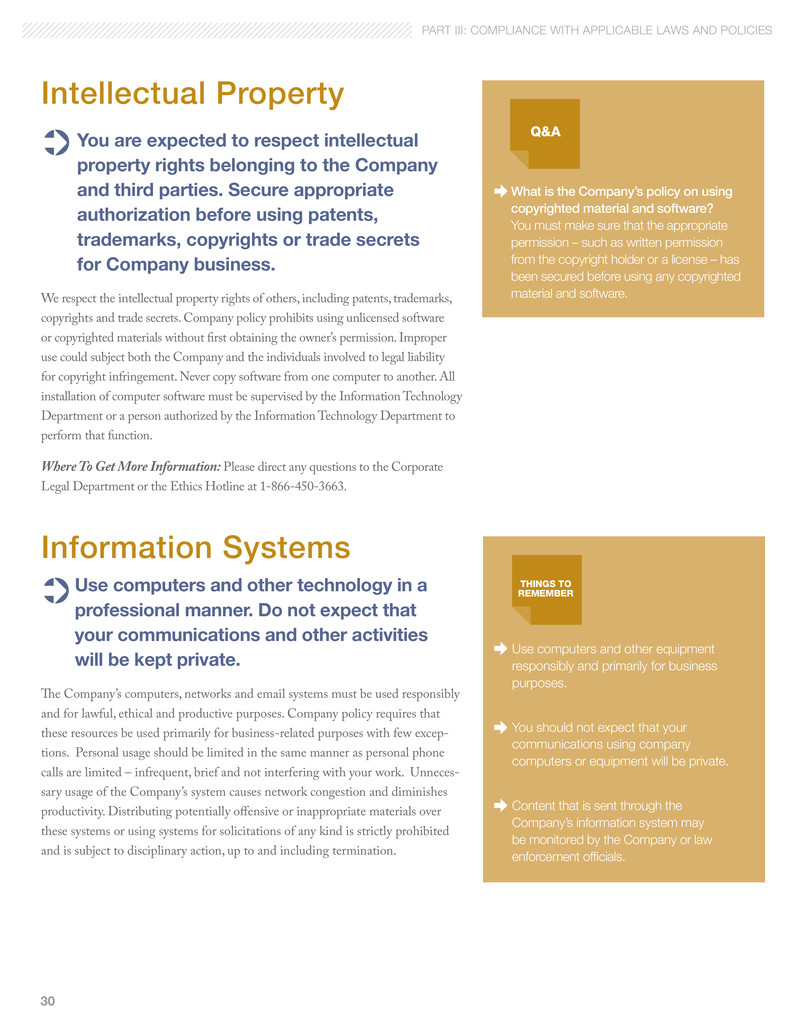
30 You are expected to respect intellectual property rights belonging to the Company and third parties. Secure appropriate authorization before using patents, trademarks, copyrights or trade secrets for Company business. Intellectual Property We respect the intellectual property rights of others, including patents, trademarks, copyrights and trade secrets. Company policy prohibits using unlicensed software or copyrighted materials without first obtaining the owner’s permission. Improper use could subject both the Company and the individuals involved to legal liability for copyright infringement. Never copy software from one computer to another. All installation of computer software must be supervised by the Information Technology Department or a person authorized by the Information Technology Department to perform that function. Where To Get More Information: Please direct any questions to the Corporate Legal Department or the Ethics Hotline at 1-866-450-3663. Information Systems The Company’s computers, networks and email systems must be used responsibly and for lawful, ethical and productive purposes. Company policy requires that these resources be used primarily for business-related purposes with few excep- tions. Personal usage should be limited in the same manner as personal phone calls are limited – infrequent, brief and not interfering with your work. Unneces- sary usage of the Company’s system causes network congestion and diminishes productivity. Distributing potentially offensive or inappropriate materials over these systems or using systems for solicitations of any kind is strictly prohibited and is subject to disciplinary action, up to and including termination. Q&A What is the Company’s policy on using copyrighted material and software? You must make sure that the appropriate permission – such as written permission from the copyright holder or a license – has been secured before using any copyrighted material and software. Use computers and other technology in a professional manner. Do not expect that your communications and other activities will be kept private. Use computers and other equipment responsibly and primarily for business purposes. You should not expect that your communications using company computers or equipment will be private. Content that is sent through the Company’s information system may be monitored by the Company or law enforcement officials. THINGS TO REMEMBER PART III: COMPLIANCE WITH APPLICABLE LAWS AND POLICIES
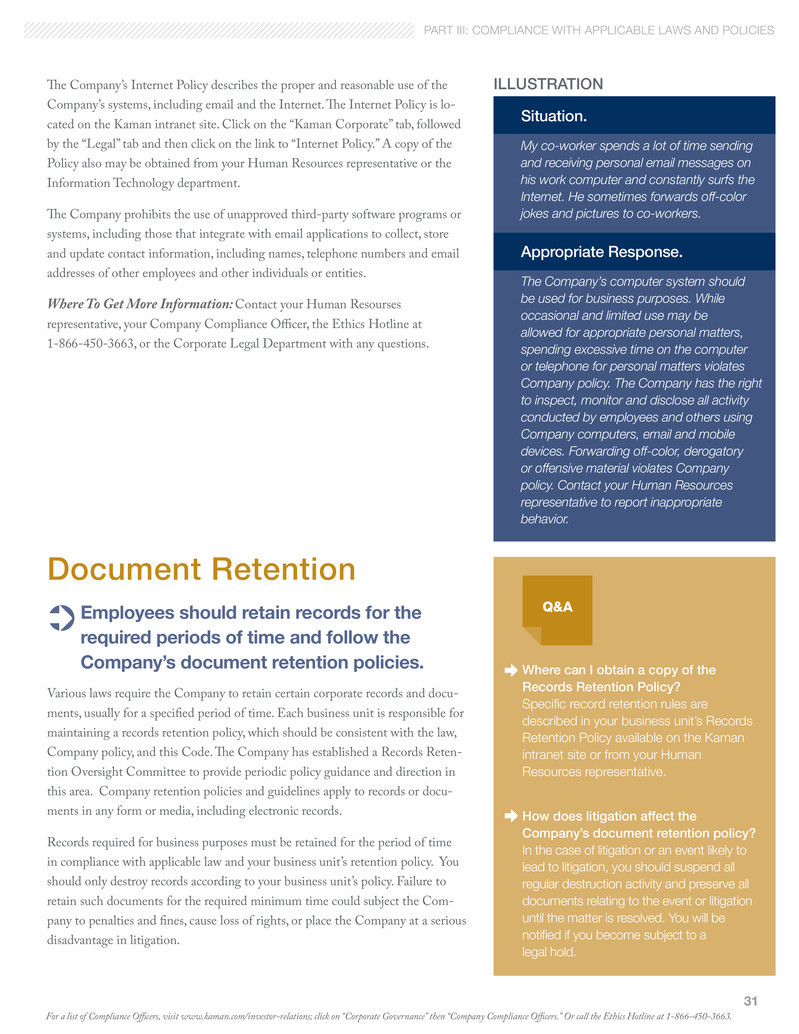
31 For a list of Compliance Officers, visit www.kaman.com/investor-relations; click on “Corporate Governance” then “Company Compliance Officers.” Or call the Ethics Hotline at 1-866-450-3663. The Company’s Internet Policy describes the proper and reasonable use of the Company’s systems, including email and the Internet. The Internet Policy is lo- cated on the Kaman intranet site. Click on the “Kaman Corporate” tab, followed by the “Legal” tab and then click on the link to “Internet Policy.” A copy of the Policy also may be obtained from your Human Resources representative or the Information Technology department. The Company prohibits the use of unapproved third-party software programs or systems, including those that integrate with email applications to collect, store and update contact information, including names, telephone numbers and email addresses of other employees and other individuals or entities. Where To Get More Information: Contact your Human Resourses representative, your Company Compliance Officer, the Ethics Hotline at 1-866-450-3663, or the Corporate Legal Department with any questions. Document Retention Various laws require the Company to retain certain corporate records and docu- ments, usually for a specified period of time. Each business unit is responsible for maintaining a records retention policy, which should be consistent with the law, Company policy, and this Code. The Company has established a Records Reten- tion Oversight Committee to provide periodic policy guidance and direction in this area. Company retention policies and guidelines apply to records or docu- ments in any form or media, including electronic records. Records required for business purposes must be retained for the period of time in compliance with applicable law and your business unit’s retention policy. You should only destroy records according to your business unit’s policy. Failure to retain such documents for the required minimum time could subject the Com- pany to penalties and fines, cause loss of rights, or place the Company at a serious disadvantage in litigation. Situation. My co-worker spends a lot of time sending and receiving personal email messages on his work computer and constantly surfs the Internet. He sometimes forwards off-color jokes and pictures to co-workers. Appropriate Response. The Company’s computer system should be used for business purposes. While occasional and limited use may be allowed for appropriate personal matters, spending excessive time on the computer or telephone for personal matters violates Company policy. The Company has the right to inspect, monitor and disclose all activity conducted by employees and others using Company computers, email and mobile devices. Forwarding off-color, derogatory or offensive material violates Company policy. Contact your Human Resources representative to report inappropriate behavior. ILLUSTRATION Employees should retain records for the required periods of time and follow the Company’s document retention policies. Q&A Where can I obtain a copy of the Records Retention Policy? Specific record retention rules are described in your business unit’s Records Retention Policy available on the Kaman intranet site or from your Human Resources representative. How does litigation affect the Company’s document retention policy? In the case of litigation or an event likely to lead to litigation, you should suspend all regular destruction activity and preserve all documents relating to the event or litigation until the matter is resolved. You will be notified if you become subject to a legal hold. PART III: COMPLIANCE WITH APPLICABLE LAWS AND POLICIES

32 As an employee, you can help with document retention requirements by ensuring that you: • Follow the Company’s record retention policies and dispose of records after they are no longer legally required to be kept. • Retain all records subject to legal holds until the Corporate Law Department authorizes destruction of such records. • Suspend all regular destruction activity in the case of litigation or a significant event likely to lead to litigation, and preserve all records until the matter is resolved. Where To Get More Information: Contact your Company Compliance Officer, the Ethics Hotline at 1-866-450-3663, or the Corporate Legal Department. Privacy and Data Protection Laws Our policy is to acquire, use and disclose confidential information about employ- ees and customers only as permitted by the laws of the jurisdictions in which we operate. Confidential information may include, but not be limited to, business, personal, financial or medical information. We intend to comply with all U.S. fed- eral, state and local privacy laws and regulations and all valid subpoenas or court orders. Non-U.S. countries may have privacy or data protection rules for personal data. We are committed to complying with those laws when the Company is sub- ject to them. You should never disclose confidential information to anyone either inside or outside of the Company, who does not have a legitimate business need for the information. Situation. I understand the Company’s record reten- tion policy requires that certain records be disposed of after they are no longer legally required to be kept. However, I may want my records to refer to after the retention period expires. Can I choose which records to retain or dispose of? Appropriate Response. No. Employees are expected to comply with the Company’s record retention policy and may not independently determine which records to retain or dispose of. If you have questions about whether documents should be retained, contact the Corporate Legal Department. ILLUSTRATION Kaman strives to protect the privacy of employees and customers, in accordance with all applicable privacy and data protection laws and regulations. Q&A What is Kaman’s policy on Privacy and Data Protection? Our policy is to acquire, use and disclose confidential information about employees and customers only as permitted by applicable law and Company policy. Confidential information may include business, personal, financial or medical information. PART III: COMPLIANCE WITH APPLICABLE LAWS AND POLICIES
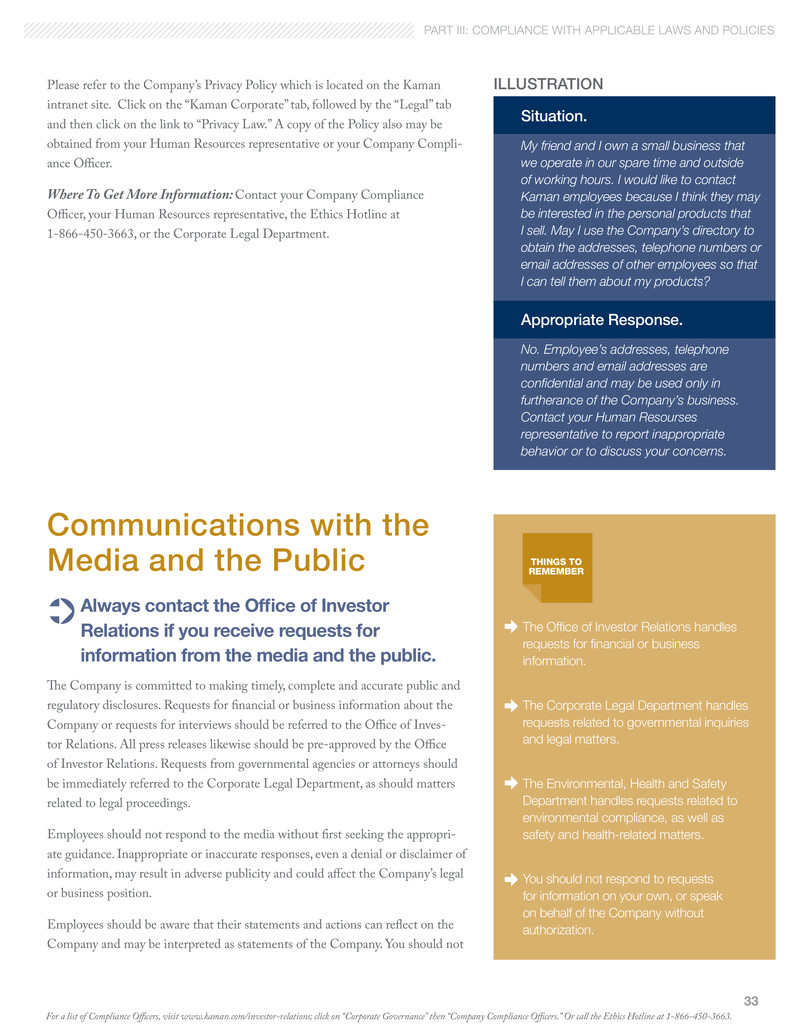
33 For a list of Compliance Officers, visit www.kaman.com/investor-relations; click on “Corporate Governance” then “Company Compliance Officers.” Or call the Ethics Hotline at 1-866-450-3663. Please refer to the Company’s Privacy Policy which is located on the Kaman intranet site. Click on the “Kaman Corporate” tab, followed by the “Legal” tab and then click on the link to “Privacy Law.” A copy of the Policy also may be obtained from your Human Resources representative or your Company Compli- ance Officer. Where To Get More Information: Contact your Company Compliance Officer, your Human Resources representative, the Ethics Hotline at 1-866-450-3663, or the Corporate Legal Department. Communications with the Media and the Public The Company is committed to making timely, complete and accurate public and regulatory disclosures. Requests for financial or business information about the Company or requests for interviews should be referred to the Office of Inves- tor Relations. All press releases likewise should be pre-approved by the Office of Investor Relations. Requests from governmental agencies or attorneys should be immediately referred to the Corporate Legal Department, as should matters related to legal proceedings. Employees should not respond to the media without first seeking the appropri- ate guidance. Inappropriate or inaccurate responses, even a denial or disclaimer of information, may result in adverse publicity and could affect the Company’s legal or business position. Employees should be aware that their statements and actions can reflect on the Company and may be interpreted as statements of the Company. You should not Situation. My friend and I own a small business that we operate in our spare time and outside of working hours. I would like to contact Kaman employees because I think they may be interested in the personal products that I sell. May I use the Company’s directory to obtain the addresses, telephone numbers or email addresses of other employees so that I can tell them about my products? Appropriate Response. No. Employee’s addresses, telephone numbers and email addresses are confidential and may be used only in furtherance of the Company’s business. Contact your Human Resourses representative to report inappropriate behavior or to discuss your concerns. ILLUSTRATION Always contact the Office of Investor Relations if you receive requests for information from the media and the public. The Office of Investor Relations handles requests for financial or business information. The Corporate Legal Department handles requests related to governmental inquiries and legal matters. The Environmental, Health and Safety Department handles requests related to environmental compliance, as well as safety and health-related matters. You should not respond to requests for information on your own, or speak on behalf of the Company without authorization. THINGS TO REMEMBER PART III: COMPLIANCE WITH APPLICABLE LAWS AND POLICIES
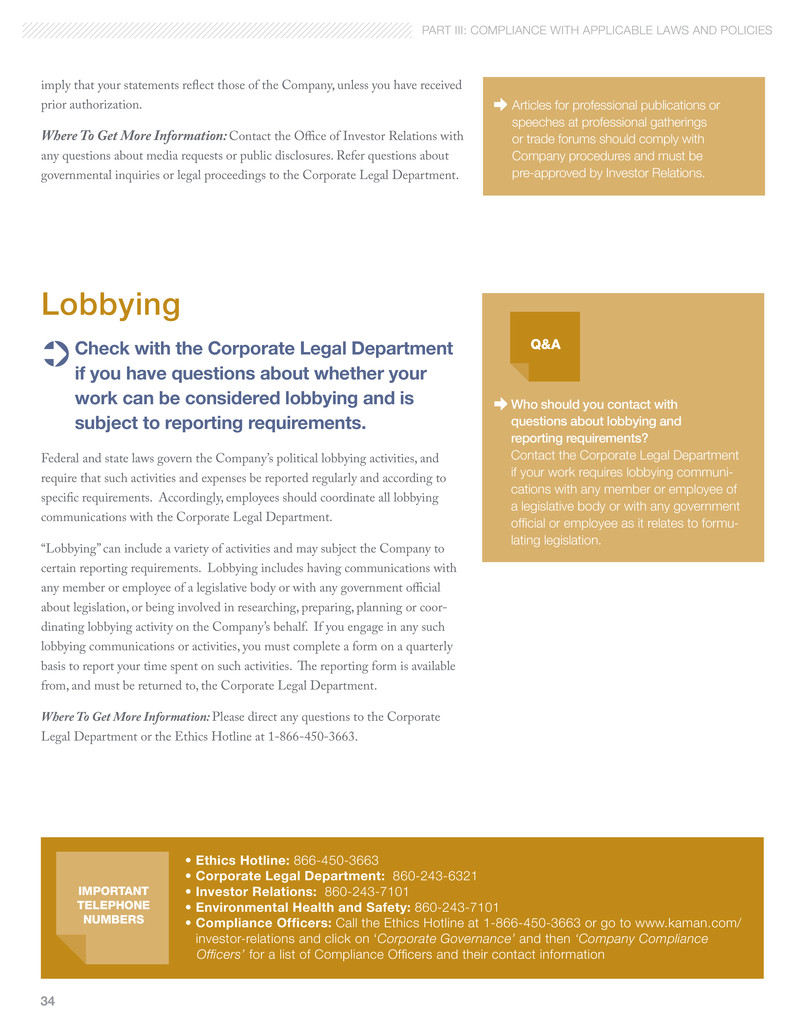
34 imply that your statements reflect those of the Company, unless you have received prior authorization. Where To Get More Information: Contact the Office of Investor Relations with any questions about media requests or public disclosures. Refer questions about governmental inquiries or legal proceedings to the Corporate Legal Department. Lobbying Federal and state laws govern the Company’s political lobbying activities, and require that such activities and expenses be reported regularly and according to specific requirements. Accordingly, employees should coordinate all lobbying communications with the Corporate Legal Department. “Lobbying” can include a variety of activities and may subject the Company to certain reporting requirements. Lobbying includes having communications with any member or employee of a legislative body or with any government official about legislation, or being involved in researching, preparing, planning or coor- dinating lobbying activity on the Company’s behalf. If you engage in any such lobbying communications or activities, you must complete a form on a quarterly basis to report your time spent on such activities. The reporting form is available from, and must be returned to, the Corporate Legal Department. Where To Get More Information: Please direct any questions to the Corporate Legal Department or the Ethics Hotline at 1-866-450-3663. Articles for professional publications or speeches at professional gatherings or trade forums should comply with Company procedures and must be pre-approved by Investor Relations. Check with the Corporate Legal Department if you have questions about whether your work can be considered lobbying and is subject to reporting requirements. Q&A Who should you contact with questions about lobbying and reporting requirements? Contact the Corporate Legal Department if your work requires lobbying communi- cations with any member or employee of a legislative body or with any government official or employee as it relates to formu- lating legislation. • Ethics Hotline: 866-450-3663 • Corporate Legal Department: 860-243-6321 • Investor Relations: 860-243-7101 • Environmental Health and Safety: 860-243-7101 • Compliance Officers: Call the Ethics Hotline at 1-866-450-3663 or go to www.kaman.com/ investor-relations and click on ‘Corporate Governance’ and then ‘Company Compliance Officers’ for a list of Compliance Officers and their contact information IMPORTANT TELEPHONE NUMBERS PART III: COMPLIANCE WITH APPLICABLE LAWS AND POLICIES
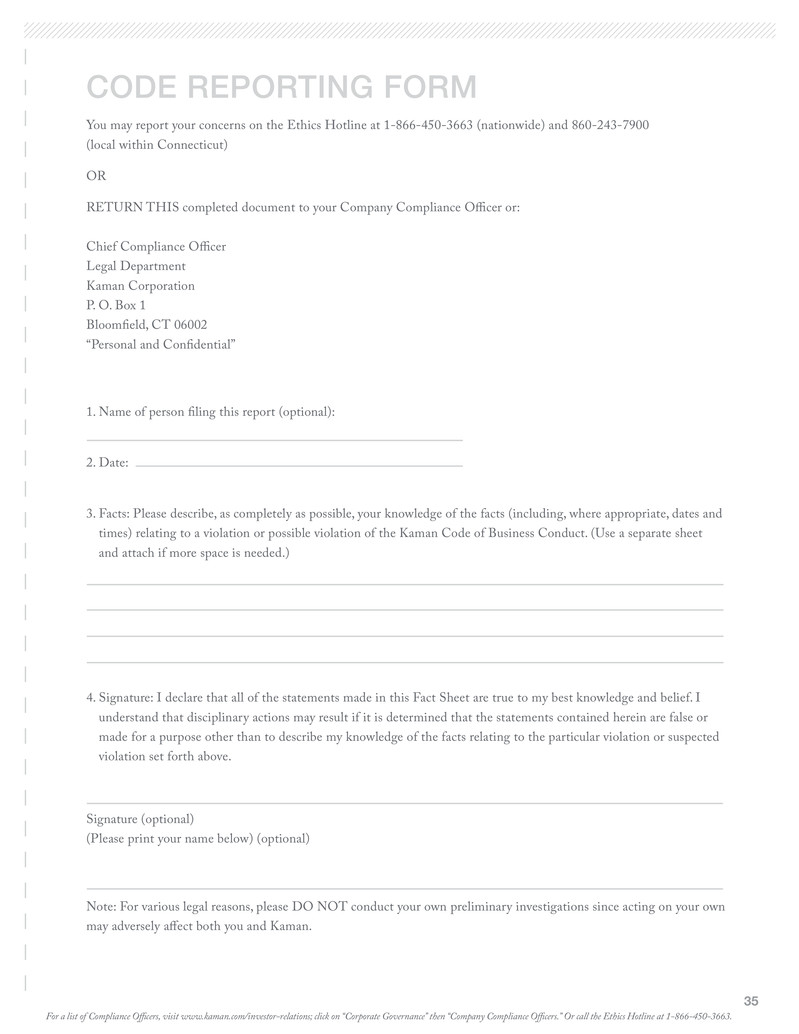
35 For a list of Compliance Officers, visit www.kaman.com/investor-relations; click on “Corporate Governance” then “Company Compliance Officers.” Or call the Ethics Hotline at 1-866-450-3663. CODE REPORTING FORM You may report your concerns on the Ethics Hotline at 1-866-450-3663 (nationwide) and 860-243-7900 (local within Connecticut) OR RETURN THIS completed document to your Company Compliance Officer or: Chief Compliance Officer Legal Department Kaman Corporation P. O. Box 1 Bloomfield, CT 06002 “Personal and Confidential” 1. Name of person filing this report (optional): 2. Date: 3. Facts: Please describe, as completely as possible, your knowledge of the facts (including, where appropriate, dates and times) relating to a violation or possible violation of the Kaman Code of Business Conduct. (Use a separate sheet and attach if more space is needed.) 4. Signature: I declare that all of the statements made in this Fact Sheet are true to my best knowledge and belief. I understand that disciplinary actions may result if it is determined that the statements contained herein are false or made for a purpose other than to describe my knowledge of the facts relating to the particular violation or suspected violation set forth above. Signature (optional) (Please print your name below) (optional) Note: For various legal reasons, please DO NOT conduct your own preliminary investigations since acting on your own may adversely affect both you and Kaman.

37 For a list of Compliance Officers, visit www.kaman.com/investor-relations; click on “Corporate Governance” then “Company Compliance Officers.” Or call the Ethics Hotline at 1-866-450-3663. CERTIFICATION STATEMENT To: Compliance Officer From: Company Personnel This is to certify and acknowledge that I have received, read and understand the Kaman Code of Business Conduct (the “Code”). I agree to comply fully with the standards contained in the Code and any related policies and procedures adopted by the Company, and understand that compliance with such standards, policies and procedures is a condition of my continued employment or association with the Company. I understand the Company has the right to access all Company and employee information, wherever located, in connection with company business, and I understand the Company has the right to conduct an investigation in the event a question of Code compliance should arise. In such event, I agree to cooperate fully with the Company and I agree to the disclosure of all relevant information to and by the Company and its compliance officers, wherever located. Signature (Please print your name below) Date: 6

38 Kaman Corporation 1332 Blue Hills Avenue Bloomfield, CT 06002 kaman.com






































